Shows

Alô, Pessoas!NANDO LEMY NO ALÔ,PESSOAS! RÁDIO HELIÓPOLIS 87,5 FM SPPrograma Alô, Pessoas! que vai ao ar sábado e domingo, das 15hs as 17hs na Rádio Comunitária Heliópolis 87,5 FM SP. Programação com música, papo maneiro e a sua participação. Entrevista com o Nando Lemy @nandolemyJornalistas:Cássio Gama @cassiogamaofhttps://instagram.com/cassiogamaof?igshid=YmMyMTA2M2Y=Rô Oliveira @ro.a.oliveira https://instagram.com/ro.a.oliveira?igshid=YmMyMTA2M2Y=
2024-09-221h 57
Lemy Talk About ABALemy Explain the ProcessWelcome to episode 4: Lemy explain the process. Lexi and Remy will explain the ins and outs of going from BT ->RBT->Fieldwork->BCBA! We hope you enjoy this episode and feel free to follow us on our platforms: Facebook and Instagram! We cannot wait to hear your feedback!
2024-08-211h 01
日本語 Japanese with DuolingoJapanese practice restaurant part 2
Anime Youtube here!
うまい (u-ma-i) = tasty
様 (sa-ma) = Mr./Ms./Mrs.
いらっしゃいませ (i-ra-ssha-i-ma-se) = arrive / welcome (to a store/shop)
いらっしゃる (i-ra-ssha-ru) = (1) to come; to go; to be (somewhere) (v5aru, vi) (hon)
いらっしゃいました (i-ra-ssha-i-ma-shi-ta) = arrived
選ぶ (era-bu) = to choose; to select (v5b, vt) (P) (えらぶ)
選んだ (e-ran-da) = I chose (えらんだ)
客 (kyaku) = customers/guests
お客様 (o-kyaku-sama) = customer; client; (+); guest; visitor (おきゃくさま)
食事 (shoku-ji) = meal; dinner (しょくじ)
食事する (shoku-ji-su-ru) = (to) have a meal; (to) dinner (しょくじする)
予約 (yo-ya-ku) = reservation/appointment (よやく)
予約をしたのですが (yo-ya-ku-wo-shi-ta-no-de-su-ga) = I made a reservation / I have a reservation
勧め (su-su-me) = recommendation (すすめ)
お勧め (o-susu-me) = recommendation; advice; (+) (n, vs, adj-no, vt) (pol) (uk)
変更 (hen-kou) = change; modification; alteration; (+) (n, vs, vt) (P) (へんこう)
変更する (hen-kou-su-ru) = (to) change; (to) modify (suru-verb) (へんこうする)
どこかおすすめの場所はありますか (do-ko-ka o-su-su-me-no-ba-sho-wa-a-ri-ma-su-ka) = Is there any place you recommend
お湯 (o-yu) = hot water
いっぱい = full; filled (with); (+)
人でいっぱいだった (hi-to-de-i-ppai-da-tta) = was filled with people
氷 (ko-o-ri) = ice (こおり)
決 (ke-tsu) = decision
決まる (ki-ma-ru) = (1) to be...
2024-07-2912 min
Lemy Talk About ABALemy Bust Those MythsWelcome back to episode 2: Lemy Bust Those Myths! On today's episode, Lexi and Remy dive into common misconceptions about the field of ABA. We will discuss our experiences with each myth, our opinions on why they are not true, and much more. As always, like and subscribe for all upcoming episodes and content!
Disclaimer: As stated in the episode, we are both first-year BCBAs still navigating this crazy field. Our statements are based on our experiences in different clinics and do not reflect on every ABA clinic you may encounter.
Sources for this episode:
ABA Centers of America. (2024, January 15). 8 myths...
2024-07-2553 min
日本語 Japanese with DuolingoMy japanese practice skill restaurant 2
和食 (wa-shoku) = Washoku/Japanese food (わしょく)
ご注文 (go-chu-mon) = your order
注文 (chū-mon) = order
うどん (u-do-n) = udon/wheat noodles
におい (ni-o-i) = smell
味 (a-ji) = taste
薄い (u-su-i) = thin / bland
濃い (ko-i) = strong / dark
こすぎます (ko-su-gi-ma-su) = it is too strong/dark
すぎる = too much / exceed
食べすぎました (ta-be-su-gi-ma-shi-ta) = ate too much
味噌汁 (mi-so-shiru) = miso soup
汁 (shi-ru) = juice / soup
味がいいです (a-ji-ga-ī-de-su) = it tastes good
味が悪い (a-ji-ga-wa-ru-i-de-su) = it tastes bad
まずい (ma-zu-i) = tastes bad
おいしい (o-i-shi) = tastes good
うまい (u-mai) = good
ごちそうします = it's my treat
残す (noko-su) = to leave undone; to not finish (のこす)
残し (no-ko-shi) = leave (のこし)
残しました (no-ko-shi-ma-shi-ta) = I left
そば (so-ba) = soba/buckwheat noodles
苦い (ni-gai) = bitter
量 (ryō) = quantity
質 (shi-tsu) = quality
大切 (tai-se-tsu) = important
"A"より"B"のほうが大切です (A yo-ri B no hou ga tai-se-tsu-de-su) = B is more important than A
少ない (su-ku-nai) = few
少し (su-ko-shi) = a bit, a little bit
うまい (u-ma-i) = tasty
様 (sa-ma) = Mr./Ms./Mrs.
いらっしゃいませ (i-ra-ssha-i-ma-se) = arrive / welcome (to a store/shop)
いらっしゃる (i-ra-ssha-ru) = (1) to come; to go; to...
2024-07-2114 min
Lemy Talk About ABALemy Introduce MyselfMeet Lexi and Remy, the creators of Lemy Talk About ABA! In this episode, we explain why we decided to make a podcast, give a brief introduction to ABA, explain how we got in the field, and so much more!
2024-07-1717 min 2024-06-0313 min
2024-06-0313 min
日本語 Japanese with DuolingoJapanese duolingo skill ClassroomLesson 1
宿題 (shu-ku-dai) = homework (しゅくだい) - [pronounced (sh-ku-da-i)]
もう (mo-u) = already
もうすぐ (mou-su-gu) = soon
まだ = still [for positive phrases]; still not / not yet [for negative phrases]
よく(yo-ku) = well
始まる (haji-ma-ru) = (1) to begin; to start; to commence (v5r, vi) (はじまる)
始まります (ha-ji-ma-ri-ma-su) = it is starting/it starts/begins (はじまります)
始まっています (ha-ji-ma-tte-i-ma-su) = it has started/begun (はじまっています)
始まっていません (ha-ji-ma-tte-i-ma-se-n) = it has not started/begun (はじまっていません)
授業 (ju-gyou) = class/lesson (じゅぎょう)
始まっていますか?(ha-ji-ma-tte-i-ma-su-ka) = has it started/begun? (はじまっていますか)
終わる (o-wa-ru) = to finish; to (come to an) end; to end; to close (v5r, vi, aux-v) (P) (おわる)
終わって (o-wa-tte) = it has ended/finshed (おわって)
終わりました (o-wa-ri-ma-shi-ta) = it ended/finished (おわりました)
終わりましたか?(o-wa-ri-ma-shi-ta-ka) = did it end/finish? (おわりましたか)
終わっていません (o-wa-tte-i-ma-se-n) = it has not ended/finished
科 (ka) = grade (か)
教科書 (kyou-ka-sho) = textbook/textbooks (きょうかしょ)
難しい (mu-zu-ka-shii) = hard/difficult (むずかしい)
難しいです (mu-zu-ka-shii-de-su) = it is hard/difficult (むずかしいです)
難しくないです (mu-zu-ka-shi-ku-nai-de-su) = it is not hard/difficult (むずかしくないです)
難しくないですか?(mu-zu-ka-shi-ku-nai-de-su-ka) = isn't it hard/difficult? (むずかしく...
2024-05-0418 min
日本語 Japanese with DuolingoJapanese duolingo skill Nature
Lesson 1
太陽 (tai-you) = the sun ()
月 (tsu-ki) = moon
星 (ho-shi) = star
きらきらして = sparkling/glistening
光る (hi-ka-ru) = to shine; to glitter; to be bright (v5r, vi) (ひかる)
キラキラ光っている (ki-ra-ki-ra hi-ka-te-i-ru) = sparkling/glistening
Previously learned:
田舎 (i-na-ka) = countryside
空気 (kū-ki) = air
浜辺 (ha-ma-be) = beach
湖 (mi-zū-mi) = lake
行くつもりです (i-ku-tsu-mo-ri-de-su) = plan to go
海洋 (kai-yō) = ocean
Previously learned:
島 (shi-ma) = island (しま)
枝 (e-da) = branch/branches (えだ)
森 (mo-ri) = forest (もり)
折る (o-ru) = (1) to break; to fracture; (+) (v5r, vt) (おる)
折り (o-ri) = broke (おり)
動物の森 (dō-bu-tsu-no-mo-ri) = Animal Crossing (a video game) (‘Animals Forest’)
景色 (ke-shi-ki) = view/scenery (けしき)
濡れ (nu-re) = wet (ぬれ)
濡れる (nu-re-ru) = to get wet (v1, vi) (P) (ぬれる)
草 (ku-sa) = grass (くさ)
木 (ki) = tree (き)
葉 (ha) = leaf (は)
木の葉 (ko-no-ha) = tree leaf/leaves (このは)
石 (i-shi) = stone (いし)
乾く (kawa-ku) = to get dry (v5k, vi) (P) (かわく)
乾いている (ka-wai-te i-ru) = it is dry
乾き (ka-wa-ki) = dry
林 (ha-ya-shi) = the woods
浅い (a-sai) = shallow
泳ぐには浅すぎます (o-yo-gu ni-wa a-sa-su-gi-ma-su) = too shallow to swim in
深い (fu-ka...
2024-03-2513 min
日本語 Japanese with DuolingoJapanese duolingo skillbankJapanese duolingo bank
Lesson 1
口座 (kō-za) = account
銀行に口座 (gin-kō-ni-kō-za) = bank account ("an account at the bank")
Lesson 1
口座 (kō-za) = account
銀行に口座 (gin-kō-ni-kō-za) = bank account ("an account at the bank")
...を開いた (...-wo-hi-rai-ta) = I opened ...
...を開きたいんですが (hi-ra-ki-ta-in-de-su-ga) = I would like to open ...
預金します (yo-kin-shi-ma-su) = I deposit
暗証番号 (an-shō-ban-gō) = PIN / Personal Identification Number
...を閉じてください (...-wo-to-ji-te-ku-da-sai) = Please close / shut ...
...を閉じたいのですが (...-wo-to-ji-tai-no-de-su-ga) = I would like to close ...
...を引き出した (...-wo-hi-ki-da-shi-ta) = I withdrew ...
暗証番号を忘れて、銀行から現金を引き出せなかった。(an-shō-ban-gō-wo-wa-su-re-te-gin-kō-ka-ra-gen-kin-wo-hi-ki-da-se-na-ka-tta) = I forgot my PIN and could not withdraw cash from my account.
暗証番号を押してください。(an-shō-ban-gō-wo-o-ka-shi-te-ku-da-sai) = Please enter your PIN. ("Push your PIN!")
引き出し (hi-ki-da-shi) = the act of withdrawing
彼はドアを押したが、開かなかった。(ka-re-wa-do-a-wo-o-shi-ta-ga-hi-ra-ka-na-ka-tta) = He pushed the door but it did not open.
普通預金口座を開きたいのですが。(fu-tsū-yo-kin-kō-za-wo...
2024-03-0913 min
Trippin on the ShoestringEp 22: "Ceasefire Now" With Kaia Jackson and Lemy CoffinOn Feb. 15, community members effectively occupied the Northampton City Council chambers, ultimately shutting the meeting down as they called on councilors to pass a ceasefire resolution amid Israel’s continued invasion and bombing campaign in Gaza. Jewish Voice for Peace activist Kaia Jackson and radical social worker Lemy Coffin join hosts Shelby Lee and Dusty Christensen to talk about local governments in western Massachusetts debating ceasefire resolutions and what it’s like to be an activist calling for action in front of those politicians.
2024-02-2654 min
日本語 Japanese with DuolingoJapanese duolingo skill ability音 (o-to) = sound/sounds, noise/noises (おと)
若く (wa-ka-ku) = young (わかく)
声 (koe) = voice; singing (of a bird); chirping (of an insect) (こえ)
怖くて (ko-wa-ku-te) = I was scared and (こわくて)
聞こえましたか?(ki-ko-e-ma-shi-ta-ka) = could you hear? (きこえましたか)
聞こえた (ki-ko-e-ta) = I could hear (きこえた)
聞こえなかった (ki-ko-e-na-ka-tta) = I could not hear (きこえなかった)
動けなかった (u-go-ke-na-ka-tta) = I could not move (うごけなかった)
動けません (u-go-ke-ma-sen) = I cannot move (うごけません)
買えません (ka-e-ma-sen) = I cannot buy (かえません)
行けません (i-ke-ma-sen) = I cannot go (いけません)
見えない (mi-e-nai) = I cannot see it (みえない)
買えない (ka-e-nai) = I cannot buy it (かえない)
行けない (i-ke-nai) = I cannot go (いけない)
行けます (i-ke-ma-su) = I can go (いけます)
見える (mi-e-ru) = I can see (みえる)
見えます (mi-e-ma-su) = I see/I look (みえます)
買えますか?(ka-e-ma-su-ka) = can I buy? (かえますか)
動けますか?(u-go-ke-ma-su-ka) = can you move? (うごけますか)
見えますか?(mi-e-ma-su-ka) = can you see? (みえますか)
会えますか?(a-e-ma-su-ka) = can you meet me? (あえますか)
カード (kaa-do) = card
書ける (ka-ke-ru) = I can write (かける)
使う (tsuka-u) = to use (a thing, a method, etc.); to make use of (つかう)
使えますか?(tsu-ka-e-ma-su-ka) = can I use it? (つかえますか)
書けますか?(ka-ke-ma-su-ka) = can you write? (かけますか)
食べられますか?(ta-be-ra-re-ma-su-ka) = can you eat it? (たべられますか)
食べにくかったです (ta-be-ni-ku-ka-tta) = it was hard to eat
...
2024-02-1418 min
日本語 Japanese with DuolingoJapanese duolingo section 3 unit 15 OlympicsLesson 1
選手 (sen-shu) = athlete (せんしゅ)
泳ぐ (o-yo-gu) = swim
水泳 (sui-ei) = swimming (すいえい)
水泳選手 (sui-ei-sen-shu) = a swimmer (すいえいせんしゅ)
体操 (tai-sou) = warm-up/gymnastics (たいそう)
運動 (un-do) = exercise
陸上 (riku-jou) = track and field (りくじょう)
なりたいです (na-ri-ta-i-de-su) = I want to be/become
なりたくない (na-ri-ta-ku-na-i) = I don't want to be/become
会場 (kai-jou) = stadium [also, venue] (かいじょう)
種目 (shu-moku) = event/events (しゅもく)
試合 (shi-ai) = match
オリンピック (o-ri-n-pi-kku) = the Olympics
どうやって = how; in what way; by what means
柔道 (juu-dou) = judo (じゅうどう)
見たいですか?(mi-ta-i-de-su-ka) = do you want to see it? (みたいですか)
楽しむ (tano-shi-mu) = to enjoy (oneself) (v5m) (P) (たのしむ)
楽しみ = (adj-na, n) = enjoyment; pleasure; diversion; amusement (たのしみ)
楽しみにする (tano-shi-mi-ni-su-ru) = to look forward/have the intention to (do) something (exp, vs-i) (たのしみにする)
楽しみにしている = looking forward/having the intention to (do) something (たのしみにしている)
出る (de-ru) = (7) to participate; to attend; to take part; (...) (v1, vi) (でる)
出ます (de-ma-su) = I will participate/I am participating (でます)
出たいです (de-ta-i-de-su) = I want to participate (でたいです)
行きたいです (i-ki-ta-i-de-su) = I want to go (いきたいです)
練習して (ren-shuu-shi-te) = I am practicing (れんしゅうして)
空手 (kara-te) = karate (からて)
スキー (su-kii) = skiing
ゴルフ...
2023-12-2315 min
日本語 Japanese with DuolingoJapanese duolingo unit 19 lesson 4still trying to figure out the new style,, please be patient with me
2023-12-2312 min
日本語 Japanese with DuolingoDuolingo update for Japanese 2023We will have to change the style of the class...we won't let duolingo stop us. We'll continue with next skill the will be "The City" this Saturday...keep practicing don't give up!
2023-12-2301 min
The Happi PodcastThe Happi Podcast: Holly Eve, CEO, Madame LemyLoss of a friend to breast cancer inspired celebrity makeup artist Holly Eve to make her own powder deodorant called Madame Lemy.
2023-09-1121 min
日本語 Japanese with DuolingoMy japanese sentences practicethis is my Japanese practice on the new style of duolingo, I'll do better next time.
2023-09-0707 min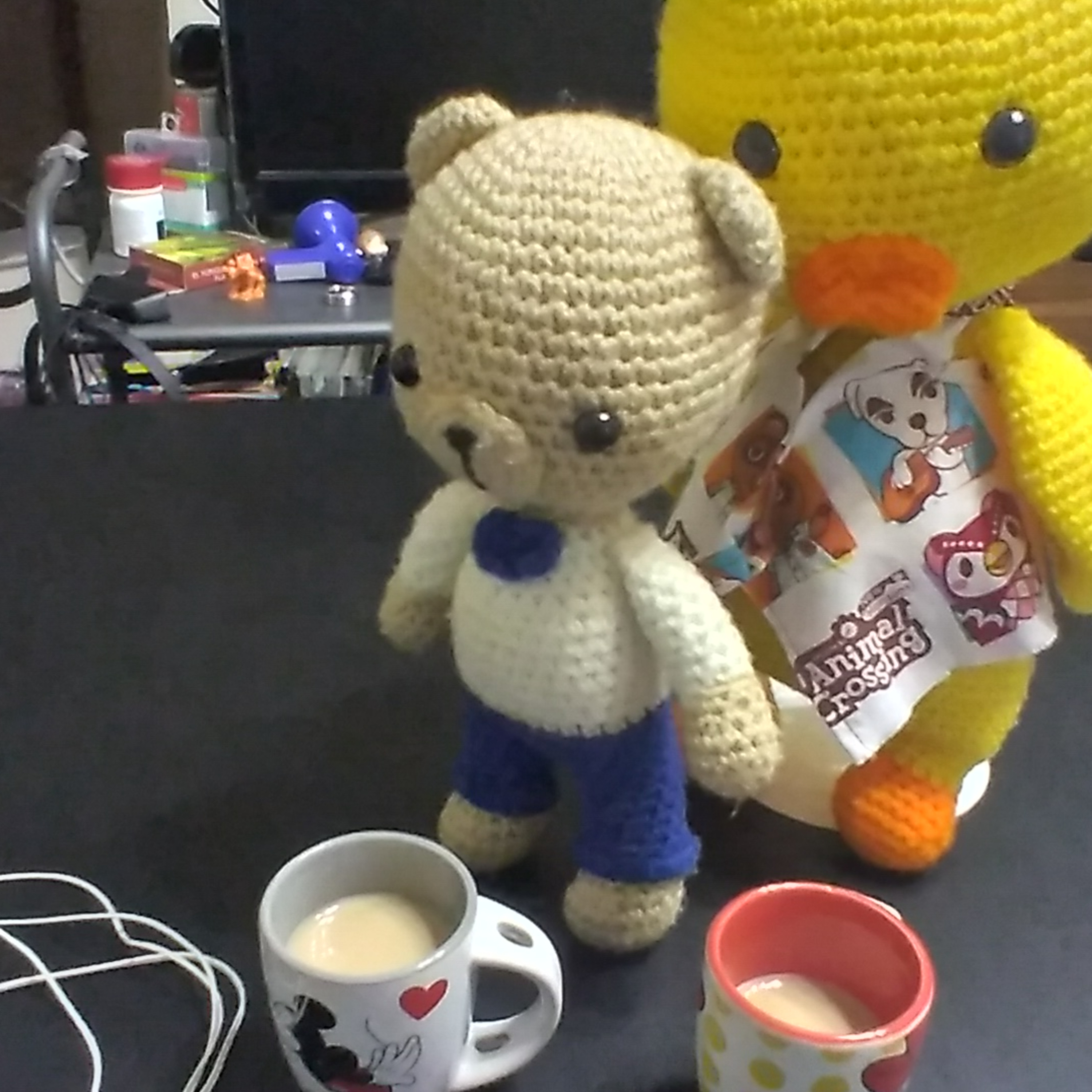
日本語 Japanese with DuolingoMy Japanese learning booksJust a video of the books I use, here are some pages
JapaneseFromZero.com: Learn Japanese online! 5 Japanese courses and video lessons. (yesjapan.com)
Easy Japanese Learn Japanese | NHK WORLD-JAPAN
My amazing instagram Japanese friends
japanese_teacher_mari
Learn Japanese dokidokicomics
taka_nihongo_dojo
2023-08-1310 min
日本語 Japanese with DuolingoJapanese duolingo skill GamesLesson
ゼルダ (ze-ru-da) = Zelda (female name)
ゲーム (gee-mu) = video game
スマホ (su-ma-ho) = smart phone
オタク (o-ta-ku) = otakus/geeks/nerds
伝説 (den-setsu) = legend/legends (でんせつ)
多くの (oo-ku-no) = many (おおくの)
一番好きな (ichi-ban-su-ki-na) = (my/your/etc.) favorite (いちばんすきな)
いろいろな (i-ro-i-ro-na) = various
初心者 (sho-shin-sha) = beginner/novice (しょしんしゃ)
倒す (tao-su) = (2) to defeat; to kill; to beat (v5s, vt) (たおす)
倒し (tao-shi) = defeat (たおし)
倒した (tao-shi-ta) = I defeated (たおした)
倒しました (tao-shi-ma-shi-ta) = I defeated it (たおしました)
倒しましたか?(tao-shi-ma-shi-ta-ka) = did you defeat it? (たおしましたか)
レベル (re-be-ru) = level
ボス (bo-su) = boss
小包 (ko-zu-tsu-mi) = parcel
高すぎる (ta-ka-su-gi-ru) = too high
チーム (chii-mu) = team
試合 (shi-ai) = match/game/competition (しあい)
勝つ (ka-tsu) = to win; to gain victory (v5s, vi) (P) (かつ)
勝ちます (ka-chi-ma-su) = I will win (かちます)
勝ちました (ka-chi-ma-shi-ta) = I won (かちました)
勝っていますか?(ka-tte-i-ma-su-ka) = are you winning? (かっていますか)
負ける (ma-ke-ru) = (1) to lose; to be defeated (v1, vi) (まける)
負けました (ma-ke-ma-shi-ta) = I lost (まけました)
負けなかった (ma-ke-na-ka-tta) = I did not lose (まけなかった)
最初 (sai-sho) = beginning; first; onset (さいしょ)
最初から (sai-sho-ka-ra) = from the beginning (さいしょから)
に勝つ (ni-ka-tsu) = it wins against/it beats (にかつ)
に負ける (ni-ma-ke-ru) = it loses to (まける)
グー (guu) = rock
パー (paa) = paper
チョキ (cho-ki) = scissors
じゃんけん (jan-ken) = rock-paper-
2023-08-0513 min
日本語 Japanese with DuolingoJapanese duolingo skill post office part 2Lesson 4
住所 (juu-sho) = address (じゅうしょ)
ご住所 (go-juu-sho) = your (honorable) address (ごじゅうしょ)
荷物 (ni-motsu) = luggage; baggage (にもつ)
届け物 (todo-ke-mono) = article to be delivered; present; package (おとどけもの)
お届け物 (o-todo-ke-mono) = your (honorable) package (おとどけもの)
届ける (todo-ke-ru) = (1) to deliver; to forward; to send (v1, vt) (とどける)
届けてください (todo-ke-te-ku-da-sai) = please deliver it (とどけてください)
来てる (ki-te-ru) = (1) to be coming (exp, v1) (きてる)
来ています (ki-te-i-ma-su) = it arrived (きています)
わかりますか?(wa-ka-ri-ma-su-ka) = do you know it?
通知 (tsuu-chi) = notice; notification; report (つうち)
通知する (tsuu-chi-su-ru) = (to) inform; (to) notify (suru-verb) (つうちする)
に通知した (ni-tsuu-chi-shi-ta) = he informed me (につうちした)
変更 (hen-kou) = change; modification; alteration (へんこう)
変更する (hen-kou-su-ru) = (to) change; (to) modifiy; (to) alter (suru-verb) (へんこうする)
大変だった (tai-hen-da-tta) = it was tough (たいへんだった)
出す (da-su) = to send (e.g. a letter) (だす)
出すの (da-su-no) = I'm sending (だすの)
出した (da-shi-ta) = I sent out (だした)
わかる (wa-ka-ru) = to understand; to grasp; to comprehend
LEsson 5
宅 (ta-ku) = (one's) house; (one's) home (たく)
お宅 (o-ta-ku) = your (honorable) home/your (honorable) house (おたく)
届く (todo-ku) = (2) to arrive; to be delivered (v5k, vi) (とどく)
届いた (to-do-i-ta) = it arrived (とどいた)
届きますか?(to-do-ki-ma-su-ka) = can you reach it? (とどきますか)
届きました (to-do-ki-ma-shi-ta) = it arrived (とどきました)
配達 (hai-tatsu...
2023-07-1609 min
日本語 Japanese with DuolingoJapanese duolingo skill post office part 1My youtube: https://youtube.com/@deliranteotaku
My amazing instagram Japanese friends japanese_yeacher_mari
Learn Japanese dokidokicomics
taka_nihongo_dojo
Lesson 1
切手 (ki-tte) = stamp/stamps (きって)
郵便局 (yuu-bin-kyoku) = post office (ゆうびんきょく)
貼る (ha-ru) = (1) to stick; to paste; to affix (v5r, vt) (はる)
貼って (ha-tte) = put/stick it on (はって)
貼ってください (ha-tte-ku-da-sa-i) = please put/stick it on (はってください)
貼りました (ha-ri-ma-shi-ta) = I put/stuck it on (はりました)
辺 (hen) = area; vicinity; region (へん)
この辺 (ko-no-hen) = around here
郵便 (yuu-bin) = mail/post (ゆうびん)
葉書 (ha-ga-ki) = postcard (はがき) [ハガキ]
呼んで欲しいんですが (yon-de-ho-shiin-de-su-ga) = I would like you to call (よんでほしいんですが)
鍵 (ka-gi) = key
鍵がかかる (kagi-ga-ka-ka-ru) = to become locked (e.g. of automatic locking) (exp, v5r) (かぎがかかる)
鍵がかかっている (ka-gi-ga-ka-ka-tte-i-ru) = to be locked (かぎがかかっている)
鍵がかかっています (ka-gi-ga-ka-ka-tte-i-ma-su) = it is locked (かぎがかかっています)
多かった (oo-ka-tta) = there was a lot (おおかった)
少なかった (su-ku-na-ka-tta) = there was a little (すくなかった)
かかる (ka-ka-ru) = to take (a resource, e.g. time or money)
かかった (ka-ka-tta) = (it) took/cost
十日 (too-ka) = 10 days (とおか)
...を送る (...-wo-oku-ru) = (1) to send (a thing); to dispatch; (...) (v5r, vt) (おくる)
...を送った (...-wo-o-ku-tta) = (I) sent ... (おくった)
...を送ってくださ...
2023-07-0908 min
日本語 Japanese with DuolingoJapanese Duolingo skill Vacation 2 or part 2Lesson 4
便利 (ben-ri) = convenient (べんり)
所 (sho) (to-ko-ro) = place
て/で (te/de) = used to connect two or more い (i)-adjectives/な (na)-adjectives [4]
あなたの言たいことはわかります (anata no iitai koto wa wakarimasu) = I understand what you mean/I understand what you want to say
アイヌ (ai-nu) = Ainu (indigenous people of Japan)
会う (a-u) = to meet; to encounter; to see (あう)
辺 (hen) = area; vicinity; region (へん)
この辺 (ko-no-hen) = this area; around here (このへん)
旅 (ta-bi) = trip; journey (it tends to be used for the process of a travel) (たび) [5]
旅行 (ryo-kō) = travel; trip; journey (it tends to be used for a travel which has clear purpose or goal (りょこう) [5]
旅に出ました (ta-bi-ni-de-ma-shi-ta) = went on a trip /embarked on a journey
旅している (ta-bi-shi-te-i-ru) = traveling (たびしている)
旅をしました (ta-bi-shi-ma-shi-ta) = went on a journey /traveled
旅行する (ryo-kō su-ru) = go on vacation
旅行をするの (ryo-kō-o-su-r...
2023-06-1809 min
日本語 Japanese with DuolingoJapanese Duolingo skill Vacation 2 part 1Check our anime and manga Youtube video: https://www.youtube.com/playlist?list=PL6DOXy3sS1s2PJDLXZZqUkLxOOST1ndZ3
Check also our kdrma youtube videos: https://www.youtube.com/playlist?list=PL6DOXy3sS1s3uK1mZKM_maO5X3nZrAQxy
Lesson 1
国 (ku-ni) = country; state; region (くに)
お国 (o-ku-ni) = honorable country (as in: "your country") (おくに)
外国 (gai-ko-ku) = foreign countries (がいこく)
外国語 (gai-ko-ku-go) = foreign languages (がいこくご)
言って (i-tte) = I tell (いって)
本当のこと (hon-tō-no-ko-to) = the truth (ほんとうのこと)
(action in plain past) + ことがあります = I have [done the (action)]
(action in plain past) + ことがありますか = Have you ever [done the (action)]?
に行くのが好きです (ni-i-ku-no-ga-suu-ki-de-su) = I like to go to
Lesson 2
旅館 (ryo-kan) = a traditional Japanese inn (りょかん)
暇 (hi-ma) = spare time; free time; leisure (ひま)
が (ga) = Used as a contraster between a main-clause and a sub-clause (similar to "but..." or "however...")
(verb in plain form) + つもり + です/だ...
2023-06-1111 min
日本語 Japanese with DuolingoJapanese duolingo skill health 1 part 2足 (a-shi) = foot/leg (あし)
痛い (ita-i) = painful; sore (いたい)
痛いです (ita-i-de-su) = it hurts (いたいです)
痛くないです (ita-ku-na-i-de-su) = it does not hurt (いたくないです
頭 (a-ta-ma) = head (あたま)
頭がいい (atama-ga-ii) = smart; being smart ("good head"); I am smart (あたまがいい)
風邪 (ka-ze) = a cold (かぜ)
引く (hi-ku) = to pull; to lead; to catch (a cold); to look up (ひく)
引いて (hi-i-te) = I caught/have (a cold) (ひいて)
お腹 (o-na-ka) = stomach (おなか)
体 (ka-ra-da) = body (からだ)
体が大きい (karada-ga-oo-ki-i) = big body; big boned; stocky; between fat and strong (からだがおおきい)
薬 (ku-su-ri) = medicine (くすり)
背 (se) = one's height (せ)
背が高い (se-ga-taka-i) = tall (person); I am tall (せがたかい)
背が低い (se-ga-hiku-i) = short (person); I am short (せがひくい)
医者 (i-sha) = doctor (いしゃ)
呼ぶ (yo-bu) = to call out; to call; to invoke (よぶ)
顔 (ka-o) = face (かお)
口 (ku-chi) = mouth (くち)
手 (te) = hand (て)
鼻 (ha-na) = nose (はな)
鼻水 (ha-na mi-zu) = nasal mucus
ぶどう (bu-dō) = grapes
病気 (byō-ki) = sick (びょうき)
病気だ (byō-ki-da) = I am sick (びょうきだ)
気持ちが悪いです (ki-mo-chi-ga-wa-rui-de-su) = I feel sick/unwell ("My feelings are bad.") (きもちがわるいです)
-su-gi-ru) = too much; to be too
...
2023-05-2812 min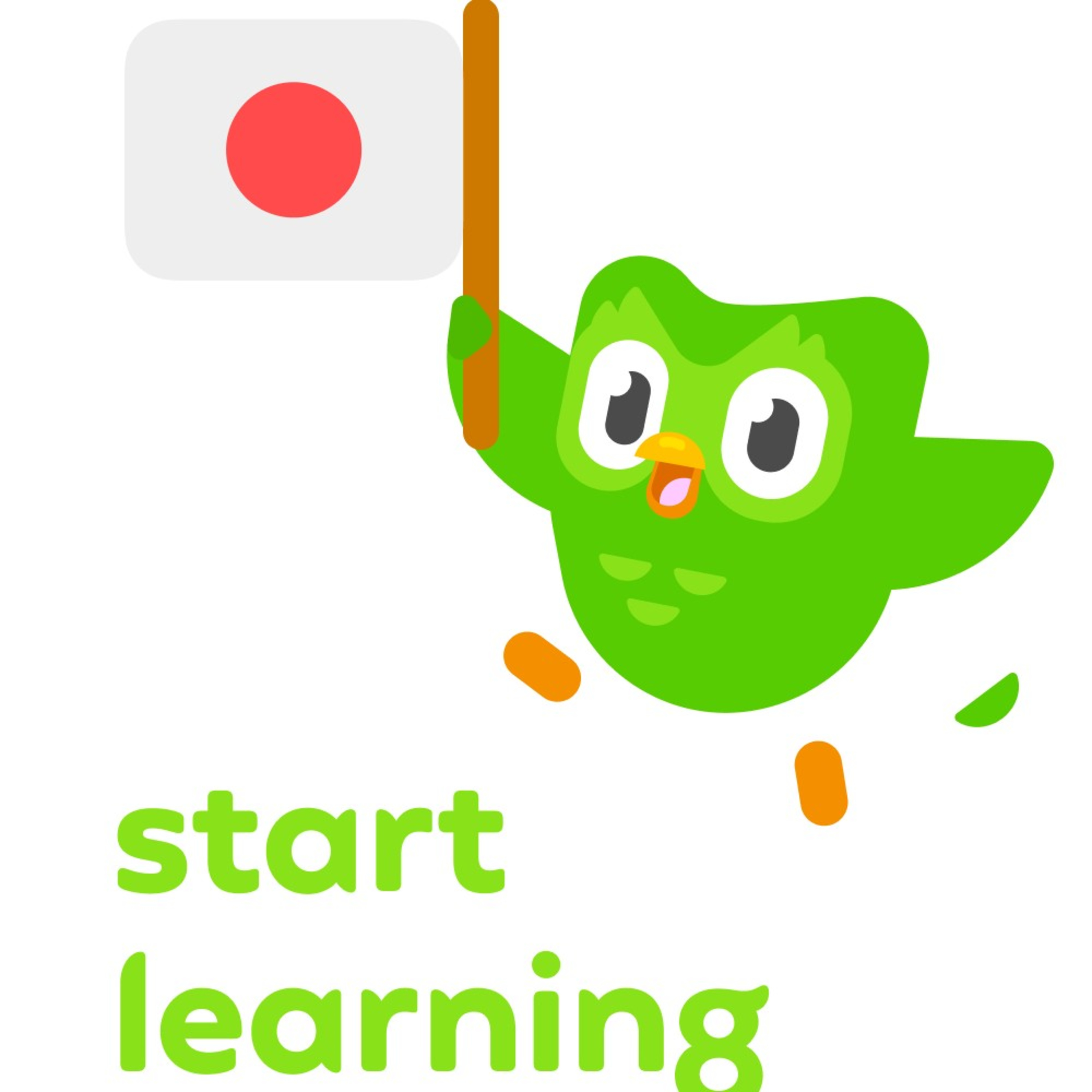
日本語 Japanese with DuolingoJapanese duolingo unit Health 1 part 1Lesson 1
足 (a-shi) = foot/leg (あし)
痛い (ita-i) = painful; sore (いたい)
痛いです (ita-i-de-su) = it hurts (いたいです)
痛くないです (ita-ku-na-i-de-su) = it does not hurt (いたくないです
頭 (a-ta-ma) = head (あたま)
頭がいい (atama-ga-ii) = smart; being smart ("good head"); I am smart (あたまがいい)
風邪 (ka-ze) = a cold (かぜ)
引く (hi-ku) = to pull; to lead; to catch (a cold); to look up (ひく)
引いて (hi-i-te) = I caught/have (a cold) (ひいて)
お腹 (o-na-ka) = stomach (おなか)
体 (ka-ra-da) = body (からだ)
体が大きい (karada-ga-oo-ki-i) = big body; big boned; stocky; between fat and strong (からだがおおきい)
薬 (ku-su-ri) = medicine (くすり)
背 (se) = one's height (せ)
背が高い (se-ga-taka-i) = tall (person); I am tall (せがたかい)
背が低い (se-ga-hiku-i) = short (person); I am short (せがひくい)
医者 (i-sha) = doctor (いしゃ)
呼ぶ (yo-bu) = to call out; to call; to invoke (よぶ)
医者を呼んでください (i-sha-wo-yo-n-de-ku-da-sa-i) = please call a doctor (いしゃをよんでください)
顔 (ka-o) = face (かお)
口 (ku-chi) = mouth (くち)
手 (te) = hand (て)
鼻 (ha-na) = nose (はな)
鼻水 (ha-na mi-zu) = nasal mucus
ぶどう (bu-dō) = grapes
病気 (byō-ki) = sick (びょうき)
病気だ (byō-ki-da) = I am sick (びょうきだ)
気持ちが悪いです (ki-mo-chi-ga-wa-rui-de-su) = I feel sick/unwell ("My feelings are bad.") (きもちがわるいです)
(...)すぎる ((...)-su-gi-ru) = (Used as an Auxiliary Verb in...
2023-05-2111 min 2023-05-0419 min
2023-05-0419 min
日本語 Japanese with DuolingoJapanese Duolingo practice unit Class 3 part 2Lesson 4
借りる (ka-ri-ru) = (1) to borrow; to have a loan (v1, vt) (かりる)
借りました (ka-ri-ma-shi-ta) = I borrowed (かりました)
借りないで (ka-ri-nai-de) = do not borrow (かりないで)
借りてください (ka-ri-te-ku-da-sai) = please borrow (かりてください)
借りないでください (ka-ri-nai-de-ku-da-sai) = please do not borrow (かりないでください)
貸す (ka-su) = (1) to lend; to loan (v5s, vt) (かす)
貸すの (ka-su-no) = to lend (かすの)
貸します (ka-shi-ma-su) = I will lend (かします)
貸してください (ka-shi-te-ku-da-sai) = may I use/please lend (かしてください)
貸すのは嫌です (ka-su-no-wa-i-ya-de-su) = I hate to lend / do not like lending
貸さないでください (ka-sa-nai-de-ku-da-sai) = please do not lend (かさないでください)
ほかの人 (ho-ka-no-hi-to) = others, other people (ほかのひと)
Lesson 5
やる (ya-ru) = (1) to do; to perform; to play (a game); to act (v5r, vt) (uk) (col) [colloquial version of する]
やります (ya-ri-ma-su) = I do it
やるの (ya-ru-no) = playing
やらないでください (ya-ra-nai-de-ku-da-sai) = please do not do/play it
危ないスポーツ (a-bu-nai su-pō-tsu) = dangerous sports
待つ (ma-tsu) = to wait; to await; to look forward to (まつ)
待ってる (ma-tte-ru) = I am waiting (まってる)
いつでも (i-tsu-de-mo) = anytime
来る (ku-ru) = to come (spatially or temporally); to approach; to arrive (くる)
来て (ki-te) = to come (きて)
水をやっています (mi-zu-o-ya-tte-i-ma-su) = I am watering it (みずをやっています)
知る ...
2023-04-2213 min
日本語 Japanese with DuolingoJapanese practice duolingo Unit 23.3 or Class 3 part 1Lesson 1
ニュース (nyuu-su) = news
授業 (jugyō) = class
大切 (tai-se-tsu) = important
ノート (noo-to) = notebook, note/notes
教科書 (kyō-ka-sho) = textbook
宿題 (shu-ku-dai) = homework
携帯電話 (kei-tai-den-wa) = cell phone/mobile phone (けいたいでんわ)
取る (to-ru) = (1) to take; to pick up; to grab; to catch (v5r, vt) (とる)
取って (tot-te) = take it (とって)
年を取って (to-shi-o-tot-te) = old (for people) (としをとって)
年を取っています (to-shi-o-tot-te-i-ma-su) = he/she is old (used for people) / "taken some years" (としをとっています)
取るのは (to-ru-no-wa) = taking / to take (とるのは)
取らないで (to-ra-nai-de) = don't take it (とらないで)
取らないでください (to-ra-nai-de-ku-da-sai) = please don't take it (とらないでください)
見る (mi-ru) = to see; to look; to watch; to view (みる)
見ないでください (mi-nai-de-ku-da-sai) = please don't look at (みないでください)
行く (i-ku) = to go; to move (in a direction or towards a specific location) (いく
行かないでください (i-ka-nai-de-ku-da-sai) = please don't go (いかないでください)
練習しないでください (ren-shuu-shi-nai-de-ku-da-sai) = please don't practice (れんしゅうしないでください)
Lesson 2
カレンダー (ka-re-n-daa) = calendar
コピー (ko-pii) = copy
コピーしてください (ko-pii-shi-te-ku-da-sai) = please copy
コピーしないでください (ko-pii-shi-nai-de-ku-da-sai) = please don't copy
文章 (bun-shō) = passage/text/sentence (ぶんしょう)
作文 (sa-ku-bun) = essay/essays (さくぶん)
書く (ka-ku) = to write; to compose; to pen (かく)
書くの (ka-ku-no) = the act of writing (かく...
2023-04-1512 min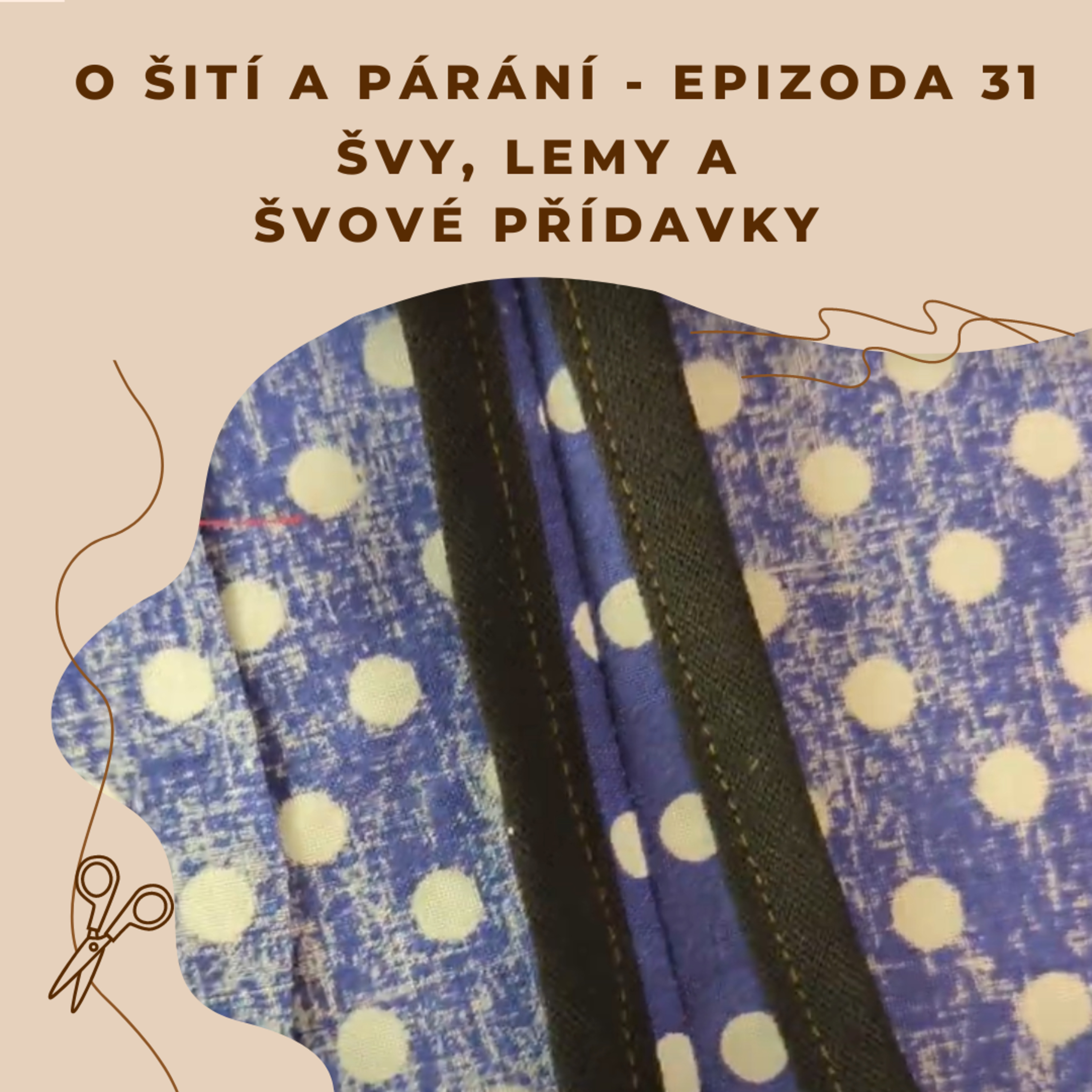
O šití a páráníEpizoda 31 - Švy, lemy a švové přídavkyV dnešní epizodě se podíváme na švy, lemy, švové přídavky a začišťování. Bára to u kabelek až tak neřeší, nicméně kdo šije oblečení ví, jak důležité je, aby švy hezky vypadaly i z rubové strany, aby se látka netřepila nebo aby střih díky přídavkům perfektně seděl.
Jak lemujete a začišťujete vy? A jak to máte se švovými přídavky?
2023-03-2232 min
日本語 Japanese with DuolingoJapanese duolingo skill hobby 3 part 2Japanese film festival link press here.
Lesson 1
テニス (te-ni-su) = tennis
野球 (ya-kyu-u) = baseball (やきゅう)
練習 (ren-shuu) = practice; training; drill (れんしゅう)
野球の練習 (ya-kyu-u-no-ren-shuu) = baseball practice (やきゅうのれんしゅう)
上手 (jou-zu) = good at (じょうず)
下手 (he-ta) = bad/not good at (へた)
結婚する (ke-kkon-su-ru) = to get married (けっこんする)
Add the particle の after the verb:泳ぐの (oyo-gu-no) = swim/swimming (およぐの)
食べるの (ta-be-ru-no) = eat/eating (たべるの)
Add the particle が + adverb:泳ぐのがはやいです (oyo-gu-no-ga-ha-ya-i-de-su) = (I) swim fast/(My) swimming is fast (およぐのがはやいです)
勉強するのが上手です (ben-kyou-su-ru-no-ga-jou-zu-de-su) = (I'm) good at studying (べんきょうするのがじょうずです)
泳ぐ (oyo-gu) = to swim (およぐ)
泳ぐのが上手 (oyo-gu-no-ga-jou-zu) = good at swimming (およぐのがじょうず)
するの (su-ru-no) = playing
疲れる (tsuka-re-ru) = to get tired; to tire; to get fatigued; (つかれる)
Lesson 2
サッカー (sa-kkaa) = soccer/football
アニメ (a-ni-me) = anime
カラオケ (ka-ra-o-ke) = karaoke
走るの (hashi-ru-no) = to run (はしるの)
字 (ji) = handwriting/writing neatly (じ)
行く (i-ku) = to go; to move (in a direction or towards a specific location) (いく)
行くの (i-ku-no) = going to (いくの)
行く時間です (i-ku-ji-kan-de-su) = it is time to go (いくじかんです)
Lesson 3
漫画 (man-ga) = manga/comic books (まんが)
撮る (to-ru) = to take (a photo); to record (video, audio, etc.) (とる)
写真を撮るの (sha-shin-o-to-ru-no) = taking photos (しゃしんをとるの)
見るの (mi-ru-no) = watc...
2023-03-1516 min
日本語 Japanese with DuolingoJapanese duolingoskill clothes 2 part 1Lesson 1
· 緑色 (midori-iro) = green (みどりいろ)
· 紫色 (murasaki-iro) = purple (むらさきいろ)
· ドレス (do-re-su) = dress
· ハンドバッグ (ha-n-do-ba-ggu) = handbag/purse
· いつも = always
· しゃれた (sha-re-ta) = stylish
· おしゃれな (o-sha-re-na) = stylish
· おしゃれじゃない (o-sha-re-ja-na-i) = not stylish
· あまり(a-ma-ri) = not very
· 全然 (zen-zen) = not at all
· 着る (ki-ru) = to wear (from the shoulders down); to put on (きる)
· 着ています (ki-tei-masu) = he/she is wearing (きています)
· いつもしゃれた服を着ています = always wearing stylish clothes (いつもしゃれたふくをきています)
Lesson 2
· 灰色 (hai-iro) = grey/gray (はいいろ)
· 靴下 (kutsu-shita) = socks (くつした)
· 足 (so-ku) = counter for socks/shoes (そく)
· 制服 (sei-fuku) = uniform/uniforms (せいふく)
· 寒かった (samu-katta) = it was cold (さむかった)
Lesson 3
· 組 (ku-mi) = pair (くみ)
· 一組 (hito-kumi) = one pair of [1](ひとくみ)
· 手袋 (te-bukuro) = glove/gloves (‘bag for the hands’) (てぶくろ)
· ベルト (be-ru-to) = belt/belts
· 革 (ka-wa) = leather (かわ)
· 締める (shi-me-ru) = (1) to fasten; to tie; to tighten (しめる)
· 締めてください (shi-me-te-ku-da-sai) = please fasten (しめてください)
Lesson 4
· ジャケット (ja-ke-tto) = jacket
· 短いです (mi-ji-ka-i-desu) = it is short (みじかいです)
· 短くないです (mi-ji-ka-kunai-desu) = it is not short (みじかくないです)
· 半袖 (han-sode) = short sleeves (はんそで)
· 長袖 (naga-sode) = long sleeves (ながそで)
Lesson 5
· いかがですか?(i-ka-ga-desu-ka) = how is it?
· サイズ (sa-i-zu) = size
· ぴったり (pi-tta-ri) = firmly/perfectly
· ぴったりです (pi-tta-ri-de-su) = it is perfect/it fits perfectly
· 着物 (ki-mono) = kimono (きもの)
· 黒帯 (kuro-obi) = black belt (くろおび)
· 浴衣 (yu-kata) = yukata/lightweight robe (ゆかた)
· 帯 (o-bi) = sa...
2023-02-1616 min
日本語 Japanese with DuolingoJapanese duolingo skill shopping 2Lesson 1
誰のもの (da-re-no-mo-no) = whose (だれのもの)
バター (ba-taa) = butter
ハンカチ (han-ka-chi) = handkerchief
ネクタイ (ne-ku-tai) = tie
グラム (gu-ra-mu) = gram
ブラウス (bu-ra-u-su) = blouse
ダイヤモンド (da-i-ya-mon-do) = diamond/diamonds
どこにもないです (do-ko-ni-mo-nai-de-su) = it is nowhere to be seen
出す (da-su) = to take out; to get out (だす)
出しました (da-shi-ma-shi-ta) = I took it out/I emptied it (だしました)
Lesson 2
もっと (mo-tto) = more
もっとかわいい (mo-tto-ka-wai-i) = cuter
のほうが (no-hou-ga) = more, better
より (yo-ri) = than
より暑い (yo-ri-a-tsu-i) = hotter than (よりあつい)
一番 (ichi-ban) = the most/the best (いちばん)
一番近い (ichi-ban-chika-i) = the closest/nearest (いちばんちかい)
洋 (you) = Occident and Orient; foreign; Western, European; ocean (よう)
洋服 (you-fuku) = (western) clothes (ようふく)
Lesson 3
着る (ki-ru) = to wear (from the shoulders down); to put on (きる)
着て (ki-te) = wore (きて)
締める (shi-me-ru) = (2) to wear (necktie; belt); to put on (v1, vt) (しめる)
締め (shi-me) = tighten (しめ)
締めて (shi-me-te) = to put on (しめて)
締めてください (shi-me-te-ku-da-sai) = please put on (しめてください)
締めます (shi-me-ma-su) = I wear/I put on (しめます)
締めました (shi-me-ma-shi-ta) = he put on (past tense) (しめました)
背 (se) = height (せ)
背広 (se-bi-ro) = suit (せびろ)
上着 (u-wa-gi) = jacket (うわぎ)
ワイシャツ (wai-sha-tsu) = dress shirt
Lesson 4
牛肉 (gyuu-ni-ku...
2023-01-3013 min
日本語 Japanese with DuolingoJapanese duolingo skill objectsLesson 1
ゆっくり (yu-kku-ri) = slowly; unhurriedly; without haste
細い (hoso-i) = thin/narrow (adjective) (ほそい)
太い (futo-i) = thick (stick/pillar shape object(ふとい)
厚い (atsu-i) = thick (board shape object) (あつい)
厚くない (atsu-ku-nai) = not thick (board shape object) (あつくない)
進む (susu-mu) = to go forward; to advance (すすむ)
進みます (susu-mi-ma-su) = go forward; go
Previously words:教科書 (kyou-ka-sho) = textbook; (きょうかしょ)
辞書 (ji-sho) = dictionary; (じしょ)
色鉛筆 (iro-en-pitsu) = colored pencil; (いろえんぴつ)
お箸 (o-hashi) = chopsticks (おはし)
少し (suko-shi) = little; few; small quantity; (すこし)
Lesson 2
丸い (maru-i) = round (まるい)
薄い (usu-i) = thin (board shape object) (うすい)
ボタン (bo-ta-n) = button
押す (o-su) = to push; to press (おす)
Lesson 3
紙 (kami) = paper (かみ)
紙を三枚 (kami-wo-san-mai) = three sheets of paper (かみをさんまい)
鍵 (kagi) = key/keys (かぎ)
なくしました (na-ku-shi-ma-shi-ta) = I lost it (past tense)
吸う (su-u) = to smoke; to breathe in; to inhale (すう)
タバコ (ta-ba-ko) = cigarette/tobacco
Lesson 4
石鹸 (se-kken) = soap (せっけん)
使う (tsuka-u) = to use (a thing, method, etc.); to make use of (つかう)
使って (tsuka-tte) = using (つかって)
使ってはいけません (tsuka-tte-hai-ke-ma-sen) = you cannot use it (つかってはいけません)
使っていますか?(tsuka-tte-i-ma-su-ka) = are you using it? (つかっていますか)
使っていません (tsuka-tte-i-ma-sen...
2023-01-1511 min
日本語 Japanese with DuolingoJapanese duolingo skill direction 2 part 2Lesson 6
橋 (ha-shi) = bridge/bridges (はし)
誰も (da-re-mo) = no-one (だれも)
誰にも (da-re-ni-mo) = anyone (だれにも)
誰でも (da-re-de-mo) = everyone (だでにも)
誰とも (da-re-to-mo) = with anyone (だれとも)
何も (na-ni-mo) = nothing/anything (なにも)
要る (i-ru) = to be needed; to be wanted (いる)
近くに (chi-ka-ku-ni) = nearby/close to (ちかくに)
この近くにあります (ko-no-chi-ka-ku-ni-a-ri-ma-su) = it is near here (このちかくにあります)
閉める (shi-me-ru) = to close; to shut (v1, vt) (P) (しめる)
閉めます (shi-me-ma-su) = I closed it
閉めています(shi-me-te-i-ma-su) = I am closing it
閉まる (shi-ma-ru) = (1) to be closed; to close; to be shut (v5r, vi) (しまる)
閉まっています (shi-ma-tte-i-ma-su) = it is closed (by itself) (しまっています)
閉まっていますか?(shi-ma-tte-i-ma-su-ka) = is it shut/closed? (しまっていますか)
閉まりました (shi-ma-ri-ma-shi-ta) = it has closed (itself) (しまりました)
言う (i-u) = to say; to utter; to declare (いう)
言いません (i-i-ma-sen) = I will not tell (いいません)
話す (hana-su) = to talk; to speak; to converse (はなす)
話しませんでした (ha-na-shi-ma-sen-de-shi-ta) = I did not speak (はなしませんでした)
には (ni-wa) = in (the)
Lesson 7
何でも (nan-de-mo) = everything/anything (なんでも)
運転手 (un-ten-shu) = driver (うんてんしゅ)
村 (mu-ra) = village (むら)
階 (kai) = floor (かい)
四階 (yon-kai) = fourth floor (よんかい)
五階 (go-kai) = fifth floor (ごかい)
十九階 (juu-kyuu-kai) = nineteenth floor (じゅうきゅうかい)
2022-12-0315 min
日本語 Japanese with DuolingoJapanese duolingo skill direction 2 part 1 Lesson 1
門 (mon) = gate (もん)
町 (ma-chi) = town/city ((としょかん)
自動車 (ji-dou-sha) = automobile (じどうしゃ)
読む (yo-mu) = to read; to recite; to chant (よむ)
読みました (yo-mi-ma-shi-ta) = I read (past tense) (よみました)
持つ (mo-tsu) = to have; to hold (in one's hand); to carry (もつ) 持っていません (mo-tte-i-ma-sen) = I don't have (もっていません)
Lesson 2
大きい (oo-ki-i) = large/big (adjective) (おおきい)
アパート (a-paa-to) = apartment
エレベーター (e-re-bee-taa) = elevator
デパート (de-paa-to) = department store
手洗い (te-ara-i) = the act of washing the hands (てあらい) お手洗い (o-te-ara-i) = bathroom/restroom
(おてあらい) 二十四時間 (ni-juu-yon-ji-kan) = twenty four hours (にじゅうよんじかん)
乗る (no-ru) = to take; to board; to get on (train, plane, bus, ship, etc.) (のる)
開く (a-ku) = (1) to open (e.g. doors); (2) to open (e.g. a business, etc.) (v5k, vi) (あく) 開く (hira-ku) = (6) to open (a new business for the first time); (...) (v5k, vt) (ひらく) 開きます (hi-ra-ki-ma-su...
2022-11-2910 min
Dying of LaughterWhere Entrepreneurship Meets Mental Health with CEO & Creative Director, Holly Eve (Madame Lemy)Holly Eve is the founder, CEO, and Creative Director of Madame Lemy, a natural and sustainable luxury body care brand. Synthesizing both of her passions, she speak regularly on entrepreneurship and mental health to a wide range of audiences and is a contributing writer for multiple publications including Forbes and Foundr. Holly is passionate about animal advocacy; she lives a vegan lifestyle and enjoy adventuring with my rescue dog, Violet. As a beauty influencer, she uses her platform to spread awareness and advocate an end to cosmetic animal testing. Prior to founding Madame Lemy, Holly worked as a celebrity and TV m...
2022-11-101h 00
日本語 Japanese with DuolingoJapanese duolingo skill directions 2I am sorry for the bad audio, this is a video/ podcast
Lesson 1
門 (mon) = gate (もん)
町 (ma-chi) = town/city (まち)
図書館 (to-sho-kan) = library (としょかん)
自動車 (ji-dou-sha) = automobile (じどうしゃ)
読む (yo-mu) = to read; to recite; to chant (よむ)
持つ (mo-tsu) = to have; to hold (in one's hand); to carry (もつ)
Lesson 2
大きい (oo-ki-i) = large/big (adjective) (おおきい)
アパート (a-paa-to) = apartment
エレベーター (e-re-bee-taa) = elevator
デパート (de-paa-to) = department store
手洗い (te-ara-i) = the act of washing the hands (てあらい)
お手洗い (o-te-ara-i) = bathroom/restroom (おてあらい)
二十四時間 (ni-juu-yon-ji-kan) = twenty four hours (にじゅうよんじかん)
乗る (no-ru) = to take; to board; to get on (train, plane, bus, ship, etc.) (のる)
開く (a-ku) = to open (e.g. doors); to open (あく)
交番 (kou-ban) = police box (こうばん)
まで (ma-de) = until
Lesson 3
玄関 (gen-kan) = entrance/entranceway (げんかん)
廊下 (rou-ka) = hallways (ろうか)
戸 (to) = sliding door (と)
Lesson 4
階段 (kai-dan) = stairs (かいだん)
上る (nobo-ru) = (1) to go up; to climb; to ascend...
2022-11-1028 min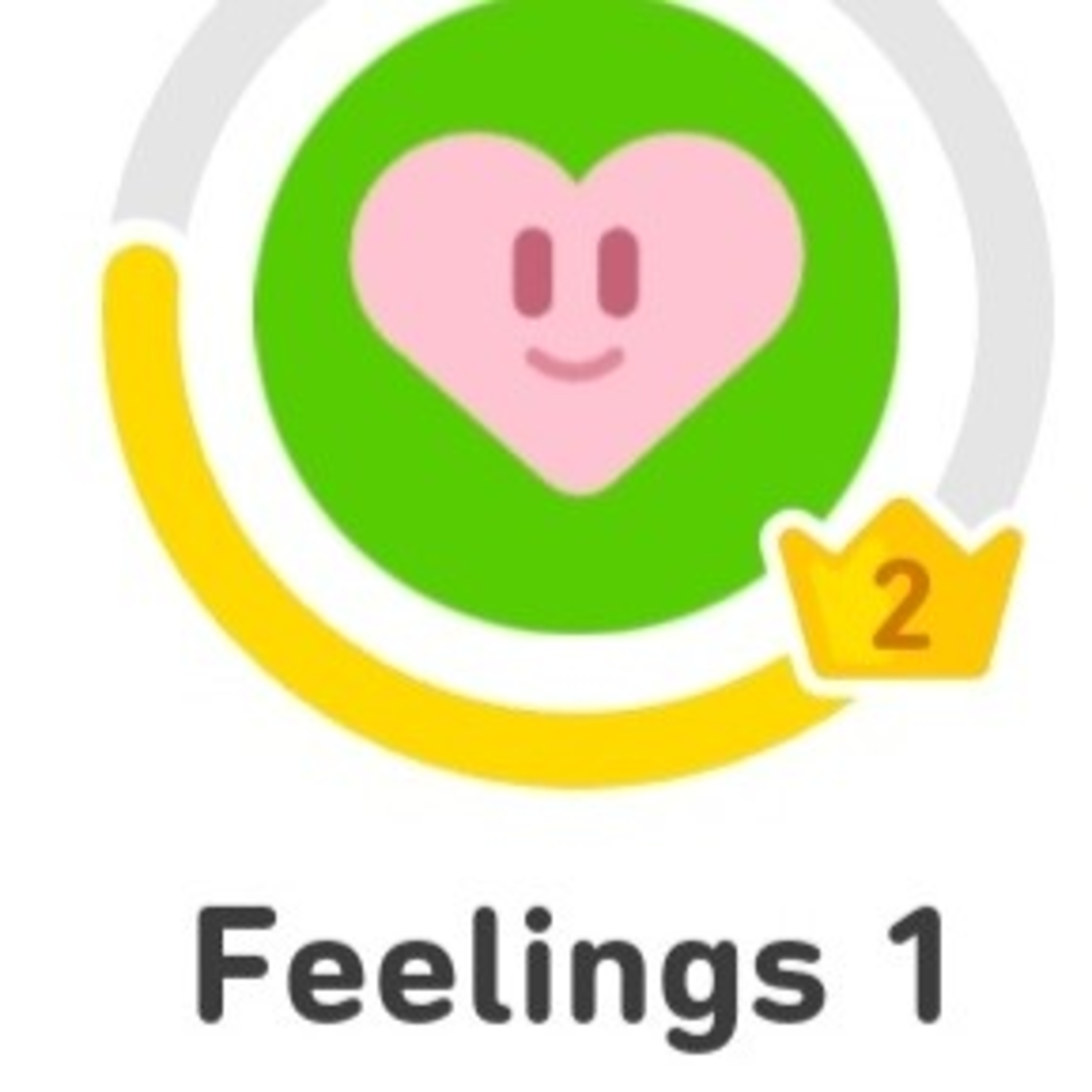 2022-11-0613 min
2022-11-0613 min
日本語 Japanese with DuolingoJapanese duolingo story: To the stationclassroom link
code: yzrgjx
**words to remember:
に のります - to ride アパートだ - aparment
うんてんしゅ - driver
えきまで! - to the station
オスカーはタクシーに のります。- Oscar will ride a taxi.
ともだちのリンがタクシーのうんてんしゅです。 - His friend Lynn is his taxi driver.
Oskar:リン!- Lynn
タクシーのうんてんしゅに なったの?- Have you become a taxi driver?
Lin:うん!- Yep
あたらしいしごとだよ!- It's a new job!
どこにいきたい?-where do you want to go
Oskar:えきまでおねがい!-Please go to the station
Lin:えきはどこに あるの?-Where is the station?
Oskar:しらないよ- I don't know
Lin:わかった… - all right…
Narrator:リンはタクシーを うんてんします。-Lynn picks up her cab.
ついたよ!-I got it!
Oskar:リン…
ここはえきじゃないよ。- This is not the station
ここはだいがくだよ。- this is the university
Lin:そっか…- I see…
Narrator:リンはタクシーを うんてんします。-Lynn drives up her cab.
Lin:ついたよ!we are here!
Oskar:リン…
Lin:なに?- what
Oskar:ここはびょういんだよ。-this is a hospital
Lin:そっか…- oh
リンは…またタクシーを うんてんします。- Lin drive the taxi again
よし、ついたよ!-ok, we are here!
Oskar:リン、ここはえきじゃないよ…- Lin, here is not the station
Lin:しってるよ。- I know
ここはわたしのアパートだから。- this place is my apparment
もう、タクシーはうんてんしたくないんだ。-
2022-11-0511 min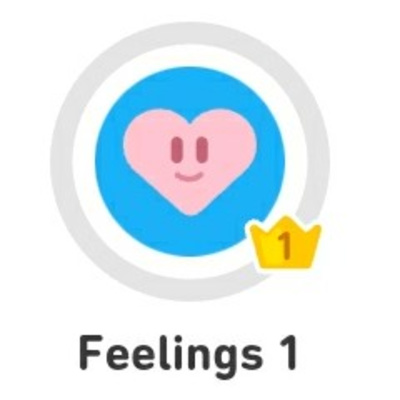
日本語 Japanese with DuolingoJapanese duolingo skill feelings vocabularyLesson 1
To describe how something is done, you turn い(i)-adjectives into adverbs (their く(ku)-form)
楽しい (ta-no-shi-i) = fun; enjoyable; pleasant; happy; delighful (たのしい)
楽しく (ta-no-shii-ku) = funnily; enjoyably; pleasantly; happily; delightfully (たのしく)
面白い (o-mo-shi-ro-i) = interesting; fascinating (おもしろい)
面白く (o-mo-shi-ro-ku) = interestingly; fascinatingly (おもしろく) Notice how the く(ku)-form is similar to adding -ly to English adjectives.
なる (to become) なる (na-ru) = to become なります (na-ri-ma-su) = to become (polite)
なっている (na-tte-i-ru) = becoming なっています (na-tte-i-ma-su) = becoming (polite)
なった (na-tta) = became なりました (na-ri-ma-shi-ta) = became (polite)
暑い (atsu-i) = hot; warm (あつい)
暑く (atsu-ku) = (く(ku)-form) hotly; warmly (あつく)
暑くなっている (atsu-ku-na-tte-i-ru) = becoming/getting hot; warm (あつくなっている) 暑くなった (atsu-ku-na-tta) = (it) became/got hot; warm (あつくなった )
から (ka-ra) = since; because
楽しいから (ta-no-shii-ka-ra) = since/because it is fun (たのしいから)...
2022-11-0324 min
日本語 Japanese with DuolingoDuolingo Japanese Story: Junior's questionジュニアのしつもん =junior's question
パパ、しつもんが あるんだけど。=Papa, I have a question.
ごめん、ジュニア。=I'm sorry, Junior.
いま、いそがしいんだ。=I'm busy now
テレビでサッカーのしあいが あるんだ。= TV is playing soccer.
エディはテレビの まえにすわります。=Eddie sits in front of the TV
しあいが はじまります。=the game begins.
いけ!いけ!いけ!=Go! Go! Go!
ぼく、おかねが ほしいんだ…=I want money...
いいぞ!=yes!
ほんとう?=Really?
ピザを かいたいから、おかねが ほしいんだけど。=I want some money because I want to buy pizza.
よし!よし!いいぞ!=All right! All right! Yes!
それにあたらしいビデオゲームが ほしいんだけど。=Also I want a new video game.
いいぞ!=yes!
あと、げつようびはがっこうを やすむね!=Also, Can I be absent from school on Monday!
いいぞ!=yes
わっ、かんたんだった!=Wow, that was easy!
いまからおみせに いくね!=I'm going to the store now!
いけ!いけ!いけ!=Go! Go! Go!
いってきます!=See you!
いいぞ!=yes!
ごめん、ジュニア…=sorry junior...
いいしあいだったよ!=It was a good game!
それで…なにが ほしいの=So... do you want ?
ジュニア?どこに いるの?=Junior? where is he
2022-10-3011 min
日本語 Japanese with DuolingoJapanese duolingo skill classroom 2 sentencesLesson 1
呼ぶ (yo-bu) = to call; to call out (to); to invoke (よぶ) と = in this lesson serves as a quotation mark (name) + と + 呼んで (to yon-de) = call me (name) (とよんで) (name) + と + 呼んでください (to-yon-de-ku-da-sai) = please call me (name) (とよんでください) 知る (shi-ru) = to know; to be aware (of); to be conscious (of); (...) (しる) 知っています (shi-tte-i-ma-su) = I know (しっています) 知っていますか?(shi-tte-i-ma-su-ka) = do you know? (しっていますか) 知りません (shi-ri-ma-sen) = I do not know (しりません) 言う (i-u) = to say; (...); to name; to call (いう) 言ってください (i-tte-ku-da-sai) = please say (いってください) 言っていました (i-tte-i-ma-shi-ta) = he/she was saying (いっていました) と言いました (to ii-ma-shi-ta) = he said (といいました) 言いますか?(ii-ma-su-ka) = do you say? (いいますか)
Lesson 2
クラス (ku-ra-su) = class 教室 (kyou-shi-tsu) = classroom/classrooms (きょうしつ) - 見せる (mi-se-ru) = to show; to display (みせる) 見せて (mi-se-te) = show me (みせて) 見せてください (mi-se-te-ku-da-sai) = please show me (みせてください) 見せます (mi-se-ma-su) = will show (みせます) 教科書 (kyou-ka-sho) = textbook 同じ (o-na-ji) = the same (おなじ)
Lesson 3
質 (shi-tsu) = quality (しつ) 問 (mon) = thing (もん) 質問 (shi-tsu-mon) = question/questions (しつもん) 問題 (mon-dai) = problem 答え (ko-ta-e) = answer (こたえ) 答える (kota-e-ru) = to answer; to...
2022-10-2311 min
日本語 Japanese with DuolingoDuolingo Japanese skill classroom 2Lesson 1
呼ぶ (yo-bu) = to call; to call out (to); to invoke (よぶ)
と = in this lesson serves as a quotation mark
(name) + と + 呼んで (to yon-de) = call me (name) (とよんで)
(name) + と + 呼んでください (to-yon-de-ku-da-sai) = please call me (name) (とよんでください)
知る (shi-ru) = to know; to be aware (of); to be conscious (of); (...) (しる)
知っています (shi-tte-i-ma-su) = I know (しっています)
知っていますか?(shi-tte-i-ma-su-ka) = do you know? (しっていますか)
知りません (shi-ri-ma-sen) = I do not know (しりません)
言う (i-u) = to say; (...); to name; to call (いう)
言ってください (i-tte-ku-da-sai) = please say (いってください)
言っていました (i-tte-i-ma-shi-ta) = he/she was saying (いっていました)
と言いました (to ii-ma-shi-ta) = he said (といいました)
言いますか?(ii-ma-su-ka) = do you say? (いいますか)
Lesson 2
クラス (ku-ra-su) = class
教室 (kyou-shi-tsu) = classroom/classrooms (きょうしつ) -
見せる (mi-se-ru) = to show; to display (みせる)
見せて (mi-se-te) = show me (みせて)
見せてください (mi-se-te-ku-da-sai) = please show me (みせてください)
見せます (mi-se-ma-su) = will show (みせます)
教科書 (kyou-ka-sho) = textbook
同じ (o-na-ji) = the same (おなじ)
Lesson 3
質 (shi-tsu) = quality (しつ)
問 (mon) = thing (もん)
質問 (shi-tsu-mon) = question/questions (しつもん)
問題 (mon-dai) = problem
答え (ko-ta-e) = answer (こたえ)
答える (kota-e-ru) = to answer; to reply (こたえる)
答えます (ko-ta-e-ma-su) = I answer/I will answer (こたえます)
答えました (ko-ta-e-ma-shi-ta) = I answered (こたえました)
答えましたか?...
2022-10-1810 min 2022-10-0607 min
2022-10-0607 min
日本語 Japanese with DuolingoDuolingo Japanese skill KonbiniLesson 1
袋 (fukuro) = bag/bags; sack; pouch (ふくろ)
お菓子 (o-ka-shi) = snacks (おかし)
少々 (shou-shou) = a bit/a little/a moment (しょうしょう)
座る (suwa-ru) = to sit; to squat; to assume (a position) (すわる)
お座り (o-su-wa-ri) = have/take a seat (おすわり)
お座りください (o-su-wa-ri-ku-da-sai) = please have/take a seat (おすわりください)
入る (hai-ru) = to enter; to go into (はいる)
お入り (o-hai-ri) = come in/enter (おはいり)
お入りください (o-hai-ri-ku-da-sai) = please come in (おはいりください)
待つ (ma-tsu) = to wait; to await; to look forward to (まつ)
お待ち (o-ma-chi) = wait (おまち)
お待ちください (o-ma-chi-ku-da-sai) = please wait (おまちください)
要る (i-ru) = to be needed; to be wanted (いる)
Lesson 2
温める (atata-me-ru) = to heat; to warm (あたためる)
温めて (atata-me-te) = heat it up (あたためて)
温めてください (atata-me-te-ku-da-sai) = please heat it up (あたためてください)
温めました (atata-me-ma-shi-ta) = I heated up (あたためました)
揚げ (a-ge) = fried (あげ)
唐揚げ (kara-a-ge) = fried chicken (からあげ)
おにぎり (o-ni-gi-ri) = a rice ball/rice balls
フライドポテト (fu-ra-i-do-po-te-to) = french fries/chips
Lesson 3 レシート (re-shii-to) = receipt
内 (u-chi) = inside (うち)
店内で (ten-nai-de) = in the store (てんないで)
もよろしいですか?(mo-yo-ru-shi-i-de-su-ka) = may I?
よろしい (yo-ro-shi-i) = you may
よろしいですか?(yo-ro-shi-i-de-su-ka) = would you like?
お願いします (o-ne-ga-i-shi-ma-su) = I would like (おねがいします)
大丈夫です (dai-jō-bu-de-su) = it's okay...
2022-10-0214 min
日本語 Japanese with DuolingoJapanese duolingo story: Transfer Studentてんこうせい = A transfer student
Narrator; ザリとリリーはスクールバスではなしています。= Zari and Lily are talking in the school bus.
Zari; リリー、わたしたちのクラスにてんこうせいが いるんだよ!= Lily, there is a transfer student in our class
なまえはミゲル。= His name is Miguel Lily;
ミゲル、ねえ。=Miguel, huh Zari;
ミゲルはメキシコしゅっしんで. = Miguel is from Mexico
ミゲルのおとうさんはほんを かくんだよ。= Miguel's dad writes books. Lily;
とてもおもしろいね。= Very interesting Zari;
ミゲルはスペインごとえいごとにほんごが わかるんだ。= Miguel knows Spanish, English and Japanese Lily;
へえ、あたまが いいんだね。= huh, he is very intelligent Zari;
あたまが よくて… = he is intelligent...
せが たかいんだ。= he is tall
それにミゲルはきれいな… = and Miguel is beautiful Lily;
きれいな...なに?= beautiful...what? Zari;
えっと、うーん… = well, umm...
きれいな…くつを もっているんだよ。= he has beautiful shoes Lily;
ザリ、ミゲルはうしろにいるよ。= Zari, Miguel is behind you Zari;
ええっ?!= wha?! Lily;
ねえ、ミゲル!= hey, Miguel! Miguel;
リリー!げんき?= Lily! How are you? Lily;
うん = alright
ミゲル、こっちはわたしのともだちのザリだよ。=Miguel, this is my friend Zari
ザリはミゲルの…くつがすきなんだよ。Zari likes Miguel's shoes Zari;
あっ、えっと、どうも、ミゲル。=oh, um, hi, Miguel. Vocabulary words
ともだち = friend はなしています = are talking
あたまが いい = smart \ intelligent
おもしろい =interesting
を もっている = しゅっしん = from (place)
せが たかい = tall
* Hints Words finishing in --んだ-- is use for me to emphasize facts Example: かくんだ vs かく わかるんだ vs わかる
2022-09-2608 min
日本語 Japanese with DuolingoJapanese duolingo story: New Coatあたらしい コート = A New Coat
Narrator; ヴィクラムは ふくや に います。= Vikram is in the clothing store.
ひとりの おんなのひとが ヴィクラム に はなしかけます。= A Woman talks to Vikram
Woman; あの、すみません。= Um, excuse me
Vikram; はい。= yes
Woman ; おみせのひと ですか?= are you a shop assistant?
Vikram; えっと、ぼくは… = well, I am...
Woman; よかった。てつだってくれませんか?= I am glad. Can you help me?
あたらしい コート が ほしいんです。= I want a new coat
この あかい コートは どうですか?= How about this red coat?
それか、この ちゃいろい コートは どうですか?= or, how about this brown coat?
Vikram; うーん、そうですね…。= hmmm, well...
その ちゃいろい コートは やすいです。= that brown coat is cheap
でも、その あかい コートは とても きれいです。= but, that red coat is very beautiful
そして、あたたかいです。= and, it is warm
あなたに
2022-09-1808 min
日本語 Japanese with DuolingoDuolingo Japanese story Doctor Eddie
Narrator: エディせんせい. - doctor Eddie
エディはスーパーに います. - Eddie is at the supermarket
ひとりのおんなの ひとがエディに はなしかけます。- A woman talks to Eddie
Woman: すみません - Excuse me
Eddie: はい?- Yes?
Woman; あの、おいしゃさんですか?- Um, are you a doctor?
Eddie: えっ?ぼくですか?えーっと… - Eh? Am I? Well...はい、…そうです。= Yes...I am
Woman; よかった!- I am glad!
Narrator; エディはおいしゃさんでは ありません。- Eddie is not a doctor
Eddie: ぼくはたくさんおかねを もっています。 - I have a lot of money
それに、ぼくのうちはおおきいです。-and, my house is very big
たかいズボンももっています。- I also have expensive pants.
Woman: へえ、でも… -eh, but...
むこうにびょうきのひとが います。- there is a sick person over there
ぎゅうにゅううりばの ちかくです!- near the milk section
そのひとを たすけてください!-please help that person.
とてもぐあいが わるそうです。- he looks very sick
Eddie: たいへんだ!- what a problem
Narrator: エディはべつのおんなのひとを みかけます。Eddie sees a different woman
そして、そのひとに...
2022-09-1106 min 2022-09-0708 min
2022-09-0708 min 2022-08-2209 min
2022-08-2209 min
日本語 Japanese with Duolingoduolingo.Japanese_Skill:Classroomhttps://duolingo.fandom.com/wiki/Japanese_Skill:Classroom
lesson 1
宿題 (shu-ku-dai) = homework (しゅくだい) - [pronounced (sh-ku-da-i)]
もう (mo-u) = already
もうすぐ (mou-su-gu) = soon
まだ (ma-da) = not yet
よく(yo-ku) = well 始まる (haji-ma-ru) = (1) to begin; to start; to commence (v5r, vi) (はじまる) 始まります (ha-ji-ma-ri-ma-su) = it is starting/it starts/begins (はじまります) 始まっています (ha-ji-ma-tte-i-ma-su) = it has started/begun (はじまっています) 始まっていません (ha-ji-ma-tte-i-ma-se-n) = it has not started/begun (はじまっていません)
Lesson 2
授業 (ju-gyō) = class/lesson (じゅぎょう) 始まっていますか?(ha-ji-ma-tte-i-ma-su-ka) = has it started/begun? (はじまっていますか) 終わる (o-wa-ru) = to finish; to (come to an) end; to end; to close (v5r, vi, aux-v) (P) (おわる) 終わって (o-wa-tte) = it has ended/finshed (おわって) 終わりました (o-wa-ri-ma-shi-ta) = it ended/finished (おわりました) 終わりましたか?(o-wa-ri-ma-shi-ta-ka) = did it end/finish? (おわりましたか) 終わっていません (o-wa-tte-i-ma-se-n) = it has not ended/finished
Lesson 3
科 (ka) = grade (か) 教科書 (kyou-ka-sho) = textbook/textbooks (きょうかしょ) 難しい (mu-zu-ka-shii) = hard/difficult (むずかしい) 難しいです (mu-zu-ka-shii-de-su) = it is hard/difficult (むずかしいです) 難しくないです (ma-zu-ka-shi-ku-nai-de-su) = it is not hard/difficult (むずかしくないです) 難しくないですか?(mu-zu-ka-shi-ku-nai-de-su-ka) = isn't it hard/difficult? (むずかしくないですか...
2022-08-1022 min
My Family Thinks I'm CrazyPierre Lemy - The Luke Mitchell Show | Sumerian Kings List, Atlantean Thoth, Black Jesus, and Ancient Genetic ManipulationLuke Mitchell and My Family Thinks I'm Crazy Present, An Interview with the Mind Body and Soul Trainer, Pierre Lemy, Live from his personal gym aka the Temple of Doom, Pierre shares his knowledge of ancient history, specifically the truths about Atlantis, Egypt and the African Diaspora, We discussed Jesus being black, and the Annunaki scheme that is still at play in the world today. Pierre is an enigma, and a Brilliant mind he is not available on the regular internet. Find more from Luke Mitchell here @luketmitchell on Instagram and his Podcast: The Luke Mitchell Show. https://altmediaunited...
2022-08-081h 58
Upside Down World With Luke Mitchell#26 - Who Are The Rothschilds? Anunnaki, Black Jesus, + Ancient Gene Manipulation! | The Luke Mitchell Show With Mark Steeves (My Family Thinks I'm Crazy Podcast) & Pierre Lemy AKA Black NostradamusLuke Mitchell and My Family Thinks I'm Crazy Present, An Interview with the Mind Body and Soul Trainer, Pierre Lemy, Live from his personal gym aka the Temple of Doom, Pierre shares his knowledge of ancient history, specifically the truths about Atlantis, Egypt and the African Diaspora, We discussed Jesus being black, and the Annunaki scheme that is still at play in the world today. Pierre is an enigma, and a Brilliant mind he is not available on the regular internet. Find more from Luke Mitchell here @luketmitchell on Instagram and his Podcast: The Luke Mitchell Show. https://altmediaunited...
2022-08-081h 53
日本語 Japanese with DuolingoJapanese duolingo skill Nature 1 part 2Music: Future
Musician: LAB HITS-Brent Horsager
URL: https://lyra.sourceaudio.com/
2022-07-2511 min
日本語 Japanese with DuolingoJapanese duolingo skill Nature part 1Music: Splash
Musician: 박신욱(@nb_sinwuk)
URL: https://soundcloud.com/sinwuk
2022-07-1713 min
日本語 Japanese with DuolingoJapanese duolingo skill activity 2 part2Please practice every day Lesson 1 それから (so-re-ka-ra) = and then/after that (used for joining sentences together) しています (shi-te-i-ma-su) = doing してください (shi-te-ku-da-sa-i) = please do 結婚 (ke-kkon) = marriage (けっこん) 洗濯 (sen-taku) = laundry (せんたく) 掃除 (sou-ji) = cleaning; dusting; sweeping; scrubbing (そうじ) 掃除する (sou-ji-su-ru) = (to) clean up; (to) dust; (to) sweep; (to) scrub (suru-verb) (そうじする) 家の掃除 (ie-no-sou-ji) = housework (いえのそうじ) Lesson 2 すぐに (su-gu-ni) = immediately シャワー (sha-waa) = shower/showers どうやって = how; in what way; by what means 読む (yo-mu) = to read (よむ) 読んでいます (yo-n-de-i-ma-su) = I am reading (よんでいます) 浴びる (a-bi-ru) = (1) to take (a shower); to dash over oneself (e.g. water); (あびる) 帰る (kae-ru) = (1) to go home; to return (to origin); to come home; to go back (かえる) Lesson 3 開ける (a-ke-ru) = (1) to open (a door, etc.); to unlock; (あける) 開け (a-ke) = open (あけ) 飲む (no-mu) = to drink; to gulp; to swallow (のむ) 食べる (ta-be-ru) = to eat (たべる) 座る (suwa-ru) = (1) to sit; to squat; (2) to assume (a position) (すわる) 座って (suwa-tte) = sit (down) (すわって) 書く (ka-ku) = to write; to co...
2022-07-0315 min
日本語 Japanese with DuolingoDuolingo Japanese Skill Activity 2I am sorry, todays epidose is long and boring. Vocabulary words clickhere
Click for my anime review podcast:Spotify
Lesson 1
それから (so-re-ka-ra) = and then/after that (used for joining sentences together)
しています (shi-te-i-ma-su) = doing
してください (shi-te-ku-da-sa-i) = please do
結婚 (ke-kkon) = marriage (けっこん)
洗濯 (sen-taku) = laundry (せんたく)
掃除 (sou-ji) = cleaning; dusting; sweeping; scrubbing (そうじ)
掃除する (sou-ji-su-ru) = (to) clean up; (to) dust; (to) sweep; (to) scrub (suru-verb) (そうじする)
家の掃除 (ie-no-sou-ji) = housework (いえのそうじ)
Lesson 2
すぐに (su-gu-ni) = immediately
シャワー (sha-waa) = shower/showers
どうやって = how; in what way; by what means
読む (yo-mu) = to read (よむ)
読んでいます (yo-n-de-i-ma-su) = I am reading (よんでいます)
浴びる (a-bi-ru) = (1) to take (a shower); to dash over oneself (e.g. water); (あびる)
帰る (kae-ru) = (1) to go home; to return (to origin); to come home; to go back (かえる)
Lesson 3
開ける (a-ke-ru) = (1) to open (a door, etc.); to unlock; (あける)
開け (a-ke) = open (あけ)
飲む (no...
2022-06-2729 min
日本語 Japanese with DuolingoDuolingo Japanese skill People part 3Today we did opposite. English to Japanese sentences
Like anime? Click for my anime review podcast:
Spotify or Googlepodcast
2022-06-1907 min
日本語 Japanese with DuolingoJapanese lesson ko-so-a-do words part 1Like anime? Click for my anime review podcast:
Spotify or Googlepodcast
Thanks to https://www.tofugu.com/japanese-grammar/kosoado/ for providing information. As soon duolingo progress we'll cover more of these concept
Concepts Things People Places Directions Manner
こ Close これ/この〜 こいつ/こなた ここ こちら/こっち こう/こんな〜
そ Away それ/その〜 そいつ/そなた そこ そちら/そっち そう/そんな〜
あ Distant あれ/あの〜 あいつ/あなた あそこ あちら/あっち ああ/あんな〜
ど Question どれ/どの〜 どいつ/どなた どこ どちら/どっち どう/どんな〜
2022-06-1210 min
日本語 Japanese with DuolingoDuolingo Japanese skill People part 2Like anime? Click for my anime review podcast:
Spotify or Googlepodcast
2022-05-3014 min
日本語 Japanese with DuolingoDuolingo Japanese skill People part 1internet link click here
女 (on-na) = woman (おんな)
人 (hi-to) = person/people (ひと)
一人 (hi-to-ri) = one person (ひとり)
方 (ka-ta) = person (polite) (かた)
立派 (ri-ppa) = splendid/magnificent (りっぱ)
どなた (do-na-ta) = who (formal)
Lesson 2
みんな (min-na) = all/you guys
皆さん (mi-na-san) = all/everyone (みなさん)
男 (o-to-ko) = man/male (おとこ)
男の人 (o-to-ko-no-hi-to) = a man (おとこのひと)
女の人 (on-na-no-hi-to) = a woman (おんなのひと)
少し (su-ko-shi) = few/some/a little (すこし)
Lesson 3
男の子 (o-to-ko-no-ko) = boy/boys (おとこのこ)
女の子 (on-na-no-ko) = girl/girls (おんなのこ)
呼ぶ (yo-bu) = (1) to call; to invoke; to call out (to) (v5b, vt) (よぶ)
呼び (yo-bi) = call (よび)
呼びます (yo-bi-ma-su) = I call/I will call (よびます)
呼びましょう (yo-bi-ma-shou) = I will/let's call (よびましょう)
呼んでください (yon-de-ku-da-sa-i) = please call (よんでください)
大勢 (oo-zei) = a lot of (people)/a crowd (おおぜい)
男の子が大勢いあす (o-to-ko-no-ko-ga-oo-zei-i-ma-su) = There are a lot of boys
彼らはみんな男のひとです(ka-re-ra-wa-mi-nna-o-to-ko-no-hi-to-de-su) = They are all men
Lesson 4
大人 (o-to-na) = adult (おとな)
女の人たち (on-na-no-hi-to-ta-chi) = women (おんなのひとたち)
女の子たち (on-na-no-ko-ta-chi) = girls (おんなのこたち)
有名 (yuu-mei) = famous/well known (ゆうめい)
まだ (ma-da) = still
若い (wa-ka-i) = young (わかい)
若いです (wa-ka-i-de-su) = am/is/are young (わかいです)
結婚 (ke-kkon) = marriage (けっこん)
結婚する (ke-kkon-su-ru) = (to) get married (suru...
2022-05-1515 min 2022-04-2512 min
2022-04-2512 min
日本語 Japanese with DuolingoJapanese with Duolingo Shopping part 2Review sentence ほかにもこなものがあります There also other things like this. Review sentence こんあにかわいい時計は他にありません There is no other clock this cute
2022-04-0712 min
日本語 Japanese with DuolingoJapanese particlesは、が、へ、に、を、か、ね、よ....no duolingo class today...this is a very silly way to explain particles
Like anime? Click for my anime review podcast:
Spotify or Googlepodcast
2022-03-2716 min
日本語 Japanese with DuolingoJapanese duolingo shopping part 1Lesson 1 花 (ha-na) = flower/flowers (はな) お金 (o-ka-ne) = money (おかね) 時計 (to-kei) = clock/clocks (とけい) Lesson 2 鞄 (ka-ban) = bag/bags (かばん) 財布 (sai-fu) = wallet/wallets (さいふ) 荷物 (ni-mo-tsu) = luggage/baggage (にもつ) Lesson 3 腕 (u-de) = arm (うで) 腕時計 (u-de-to-kei) = watch (うでとけい) かわいいです (ka-wa-ii-de-su) = it is cute かわいいですか? (ka-wa-ii-de-su-ka) = is it cute? かわいくないです (ka-wa-i-ku-nai) = it isn't/is not cute かわいくないですか? (ka-wa-i-ku-nai-de-su-ka) = isn't it cute? ほかに (ho-ka-ni) = else どんな + [thing] (do-n-na) = what kind of [thing] 他に (ho-ka-ni) = other こんな (kon-na) = like this も (mo) = also もの (mo-no) = things いかが (i-ka-ga) = how about 他にもこんなもの (ho-ka-ni-mo-kon-na-mo-no) = also other things like this 私のもの (wa-ta-shi-no-mo-no) = mine/belongs to me (わたしのもの) 彼女のもの (ka-no-jo-no-mo-no) = hers/belongs to her (かのじょのものも) Lesson 4 軽い (ka-ru-i) = light (かるい) 軽いですか? (ka-ru-i-de-su-ka) = is it light? (かるいですか) 軽くないです (ka-ru-ku-nai-de-su) = it is not/isn't light (かるくないです) 重い (o-mo-i) = heavy (おもい) 重いですか (o-mo-i-de-su-ka) = is it heavy? (おもいですか) 重くないです (o-mo-ku-nai-de-su) = it is not/isn't heavy (おもくないです) きれいな (ki-rei-na) = pretty きれいです (ki-rei-de-su) = it is/they are pretty 丈夫な (jō-bu-na) = sturdy/durable (じょうぶな) 丈夫です (jō-bu-de-su) = it is sturdy (じょうぶです) 色々 (i-ro-i-ro) = all sorts (of things) / for everything (いろいろ) いろいろありがとう (i-ro-i-ro-a-ri-ga-tō) = thank you for everything Lesson 5 大好き (dai-su-ki) = l...
2022-03-2011 min
日本語 Japanese with DuolingoJapanese Age and IntorducctionWe covered today:
Hajimemashite, _____desu. Yoroshiku onegaishimasu.
はじめまして, _____ です。よろしく お願いします。
1 year issai not “ichi sai”
2 year ni sai
3 years san sai
4 years yon sai not “shi sai”
5 years go sai
6 years roku sai
7 years nana sai not “shichi sai”8 hassai not “hachi sai”
9 kyuu sai not“kusai” (¡kusai means stinky!)
10 jussai not “juu sai“
11 juu issai not “juu ichi sai“
12 juu ni sai
13 juu san sai
14 juu yon sai na “juu shi sai“
15 juu go sai
16 juu roku sai
17 juu nana sai not“juu shichi sai”
18 juu hassai not “juu hachi sai”
19 juu kyuu sai
20 hatachi not“ni juu sai“
21 ni juu issai not“ni juu ichi sai“
22 años de edad ni juu ni sai
23 ni juu san sai
24 ni juu y...
2022-03-0615 min
日本語 Japanese with DuolingoDates duolingo Japanese_Skill part 3https://duolingo.fandom.com/wiki/Japanese_Skill:Dates かかる (ka-ka-ru) = to take ( time or money) かかります (ka-ka-ri-ma-su) = it takes かかりました (ka-ka-ri-ma-shi-ta) = it took 何曜日 (nan-you-bi) = what day of the week (なんようび) 一日 (tsui-tachi) = first day /one day (ついたち) 二日 (futsu-ka) = second day ()/two days (ふつか) 三日 (mi-kka) = third day /three days (みっか) 四日 (yo-kka) = fourth day /four days (よっか) 五日 (itsu-ka) = fifth day /five days (いつか) 何月 (nan-tsuki) = what/which month (なんつき) 一月 (ichi-gatsu) = January (いちがつ) 二月 (ni-gatsu) = February (にがつ) 三月 (san-gatsu) = March (さんがつ) 四月 (shi-gatsu) = April (しがつ) 五月 (go-gatsu) = May (ごがつ) 七月 (shichi-gatsu) = July (しちがつ) 十月 (jyuu-gatsu) = October (じゅうがつ) 六日 (mui-ka) = 6th day /six days (むいか) 七日 (nano-ka) = 7th day/seven days (なのか) 八日 (you-ka) = 8th day /eight days (ようか) 九日 (kokono-ka) = 9th day /nine days (ここのか) 十日 (too-ka) = 10th day /ten days (とおか) 二十日 (hatsu-ka) = 20th day /twenty days (はつか) 六月 (roku-gatsu) = June (ろくがつ) 八月 (hachi-gatsu) = August (はちがつ) 九月 (ku-gatsu) = September (くがつ) 十一月 ( jyuu-ichi-gatsu) = November (じゅういちがつ) 十二月 (jyuu-ni-gatsu) = December (じゅうにがつ) 一年 (ichi-nen) = one year (いちねん) 二年 (ni-nen) = two years (にねん) 五年 (go-nen) = five y...
2022-02-1406 min
日本語 Japanese with DuolingoDates duolingo Japanese_Skill part 2今日 (Kyō, Today)
昨日 (Kinō, Yesterday)
明日 (Ashita, Tomorrow)
一昨日 (Ototoi, The Day before Yesterday)
明後日 (Asatte, The Day after Tomorrow)
週 (Shū, week)
今週 (Konshū, This Week)
先週 (Senshū, Last Week)
来週 (Raishū, Next Week)
再来週 (Saraishū, The Week after Next)
月 (Getsu)
今月 (Kongetsu, This Month)
先月 (Sengetsu, Last Month)
来月 (Raigetsu, Next Month)
再来月 (Saraigetsu, The Month after Next)
年 (Nen)
今年 (Kotoshi, This Year)
去年 (Kyonen, Last Year)
来年 (Rainen, Next Year)
2022-02-0514 min
日本語 Japanese with DuolingoDates duolingo Japanese_Skill part 1https://duolingo.fandom.com/wiki/Japanese_Skill:Dates かかる (ka-ka-ru) = to take ( time or money) かかります (ka-ka-ri-ma-su) = it takes かかりました (ka-ka-ri-ma-shi-ta) = it took 何曜日 (nan-you-bi) = what day of the week (なんようび) 一日 (tsui-tachi) = first day /one day (ついたち) 二日 (futsu-ka) = second day ()/two days (ふつか) 三日 (mi-kka) = third day /three days (みっか) 四日 (yo-kka) = fourth day /four days (よっか) 五日 (itsu-ka) = fifth day /five days (いつか) 何月 (nan-tsuki) = what/which month (なんつき) 一月 (ichi-gatsu) = January (いちがつ) 二月 (ni-gatsu) = February (にがつ) 三月 (san-gatsu) = March (さんがつ) 四月 (shi-gatsu) = April (しがつ) 五月 (go-gatsu) = May (ごがつ) 七月 (shichi-gatsu) = July (しちがつ) 十月 (jyuu-gatsu) = October (じゅうがつ) 六日 (mui-ka) = 6th day /six days (むいか) 七日 (nano-ka) = 7th day/seven days (なのか) 八日 (you-ka) = 8th day /eight days (ようか) 九日 (kokono-ka) = 9th day /nine days (ここのか) 十日 (too-ka) = 10th day /ten days (とおか) 二十日 (hatsu-ka) = 20th day /twenty days (はつか) 六月 (roku-gatsu) = June (ろくがつ) 八月 (hachi-gatsu) = August (はちがつ) 九月 (ku-gatsu) = September (くがつ) 十一月 ( jyuu-ichi-gatsu) = November (じゅういちがつ) 十二月 (jyuu-ni-gatsu) = December (じゅうにがつ) 一年 (ichi-nen) = one year (いちねん) 二年 (ni-nen) = two years (にねん) 五年 (go-nen) = five y...
2022-02-0116 min
日本語 Japanese with DuolingoJapanese numbers 0 through 9,000 special classThis is extra material not covered in duolingo, this is your extra work.At the end of the description are the anwers:
1) 34
2) 59
3) 29
4) 78
5) 120
6) 392
7) 57
8) 3,004
9) 1,203
10) 789
11) 99
12) 4,675
13) 932
14) 8,773
222 ni hyaku ni juu ni
555 go hyaku go juu go
888 happyaku hachi juu hachi
4,444 yon sen yon hyaku yon juu yon
7,777 nana sen nana hyaku nana juu nana
639 roppyaku san juu kyuu
360 sanbyaku roku juu
2,512 ni sen go hyaku juu ni
8,096 hassen kyuu juu roku
9,853 kyuu sen happyaku go juu san
rei, maru, zero 0
Ichi 1
Ni 2
San 3
shi, yon 4
Go 5
Roku 6
shichi, nana 7
Hachi 8
ku, kyuu 9
Juu 10
juu ichi 11
juu ni 12
juu san 13
juu yon, juu shi 14
juu go 15
juu roku 16
juu nan...
2022-01-2318 min 2022-01-1607 min
2022-01-1607 min
日本語 Japanese with DuolingoJapanese Duoling Skill Food 3 part 2Please check my anime podcast:
https://open.spotify.com/show/1jm46nf3tqAcCd7LFa0YWz?si=d2941244fdc044d8
Word list:
Lesson 1
本 (hon) = counter for long object (ほん)
二本 (ni-hon) = two long objects (e.g. chopsticks/books (にほん)
お腹 (o-na-ka) = stomach (おなか)
お皿 (o-sa-ra) = plate (おさら)
お箸 (o-ha-shi) = chopsticks (おはし)
コップ (ko-ppu) = a glass/cup
使う (tsuka-u) = to use (a thing, a method, etc.); to make use of (つかう)
使いません (tsu-kai-ma-sen) = do/does not use (つかいません)
空く (su-ku) = (1) to get empty; to thin out; to become less crowded (v5k, vi) (すく)
お腹がすきました (o-na-ka-ga-su-ki-ma-shi-ta) = I am hungry (literally: 'My stomach emptied') (おなかがすきました)
お腹がすきません (o-na-ka-ga-su-ki-ma-sen) = I am not hungry (おなかがすきません)
お腹がすきましたか (o-na-ka-ga-su-ki-ma-shi-ta-ka) = are you hungry? (literally: 'Has your stomach been emptied?') (おなかがすきましたか)
食べる (ta-be-ru) = to eat (たべる)
食べ過ぎた (ta-be-su-gi-ta) = ate too much (たべすぎた)
洗う (ara-u) = to wash; to clea...
2021-11-2811 min
Nós Por Nós com Evandro OliveiraEvandro Oliveira entrevista Nando LemyLive surpresa com meu irmão Nando Lemy! sempre extremamente gostoso bater papo com este cara! vale a pena conferir o bate-papo com o ícone da Zona norte!
2021-11-251h 15
日本語 Japanese with DuolingoJapanese with duolingo Skill Food 3Please visit my anime podcast https://open.spotify.com/show/1jm46nf3tqAcCd7LFa0YWz?si=27dP6dDOSNuB6kSXdkPVQw&utm_source=copy-link Words online : https://duolingo.fandom.com/wiki/Japanese_Skill:Food_3 Lesson 1 本 (hon) = counter for long object (ほん) 二本 (ni-hon) = two long objects (e.g. chopsticks/books (にほん) お腹 (o-na-ka) = stomach (おなか) お皿 (o-sa-ra) = plate (おさら) お箸 (o-ha-shi) = chopsticks (おはし) コップ (ko-ppu) = a glass/cup 使う (tsuka-u) = to use (a thing, a method, etc.); to make use of (つかう) 使いません (tsu-kai-ma-sen) = do/does not use (つかいません) 空く (su-ku) = to get empty; to thin out; to be hungry (すく) お腹がすきました (o-na-ka-ga-su-ki-ma-shi-ta) = I am hungry (literally: 'My stomach emptied') (おなかがすきました) お腹がすきません (o-na-ka-ga-su-ki-ma-sen) = I am not hungry (おなかがすきません) お腹がすきましたか (o-na-ka-ga-su-ki-ma-shi-ta-ka) = are you hungry? (literally: 'Has your stomach been emptied?') (おなかがすきましたか) 食べる (ta-be-ru) = to eat (たべる) 食べ過ぎた (ta-be-su-gi-ta) = ate too much (たべすぎた) 洗う (ara-u) = to wash; to cleanse; to...
2021-11-2218 min
日本語 Japanese with DuolingoJapanese duolingo Skill:Family_2Please visit my anime podcast https://open.spotify.com/show/1jm46nf3tqAcCd7LFa0YWz?si=27dP6dDOSNuB6kSXdkPVQw&utm_source=copy-link. Words online : https://duolingo.fandom.com/wiki/Japanese_Skill:Family_2
Lesson 1
親戚 (shin-se-ki) = relatives (しんせき)
息子 (mu-su-ko) = my son (むすこ) - [pronounced (mu-s-ko)]
息子さん (mu-su-ko-san) = your son (むすこさん) - [pronounced (mu-s-ko-san)]
娘 (mu-su-me) = my daughter (むすめ)
習い (na-rai) = learning (ならい)
歳 (sai) = years old (さい)
歳 (to-shi) = age (とし)
八歳 (ha-ssai) = 8 years old (はっさい)
Lesson 2
おじ (o-ji) = my uncle
おば (o-ba) = my aunt
いとこ (i-to-ko) = my cousin
二十歳 (ha-ta-chi) = 20 years old/coming of age (はたち)
孫 (ma-go) = grandchildren (まご)
孫息子 (ma-go-mu-su-ko) = my grandson (まごむすこ)
孫娘 (ma-go-mu-su-me) = my granddaughter (まごむすめ)
お孫さん (o-ma-go-san) = your grandchild/grandchildren (おまごさん)
兄弟 (kyou-dai) = brother(s) / sibling(s) (きょうだい)
Lesson 3
夫 (o-tto) = my husband (おっと)
妻 (tsu-ma) = my wife (つま)
お子さん (o-ko-san) = your child (おこさん)
お子さんたち (o-ko-san-ta-chi) = your children (おこさんたち)
こちら (ko-chi-ra) = this is/this way/over here
おいくつ (o-i-ku-tsu) = how old (polite)
Lesson 4
ご主人 (go-shu-jin...
2021-11-0719 min
日本語 Japanese with DuolingoDuolingo Japanese skill family 1 part 2 家族 (かぞく)Please visit my anime podcast https://open.spotify.com/show/1jm46nf3tqAcCd7LFa0YWz?si=27dP6dDOSNuB6kSXdkPVQw&utm_source=copy-link Words online : https://duolingo.fandom.com/wiki/Japanese_Skill:Family_1 Lesson 1 彼 (ka-re) = he/boyfriend (かれ) 彼の (kare-no) = his (かれの) 彼女 (kano-jo) = she (かのじょ) 彼女の (kanojo-no) = her (かのじょの) 誰 (da-re) = who (だれ) 行きますか?(i-ki-ma-su-ka) = are you going? (いきますか) Lesson 2 姉 (a-ne) = older/big sister (あね) 兄 (a-ni) = older/big brother (あに) 妹 (i-mou-to) = younger sister (いもうと) 弟 (o-tou-to) = younger brother (おとうと) 二人 (futa-ri) = two people (ふたり) 七人 (shichi-nin) = seven people (しちにん) Lesson 3 私たち (watashi-tachi) = we (わたしたち) 彼ら (kare-ra) = they (male) (かれら) 彼女たち (kanojo-tachi) = they (female) (かのじょたち) 兄弟 (kyou-dai) = siblings/brothers (きょうだい) (usually for male siblings, but can be used for sisters) [1] [2] 姉妹 (shi-mai) = (female) siblings/sisters (しまい) お兄さん (o-nii-san) = older brother (formal, polite) (おにいさん) お姉さん (o-nee-san) = older sister (formal, polite) (おねえさん) 三人 (san-nin) = three people (さんにん) 四人 (yo-nin) = four people (よにん) Lesson 4 あなた (a-na-ta) = you (informal and rarely used as it is considered impolite) [3] あなたの (a...
2021-10-2106 min
日本語 Japanese with DuolingoDuolingo Japanese Skill Family 1Please visit my anime podcast https://open.spotify.com/show/1jm46nf3tqAcCd7LFa0YWz?si=27dP6dDOSNuB6kSXdkPVQw&utm_source=copy-link Words online : https://duolingo.fandom.com/wiki/Japanese_Skill:Family_1
Lesson 1
彼 (ka-re) = he/boyfriend (かれ)
彼の (kare-no) = his (かれの)
彼女 (kano-jo) = she (かのじょ)
彼女の (kanojo-no) = her (かのじょの)
誰 (da-re) = who (だれ)
行きますか?(i-ki-ma-su-ka) = are you going? (いきますか)
Lesson 2
姉 (a-ne) = older/big sister (あね)
兄 (a-ni) = older/big brother (あに)
妹 (i-mou-to) = younger sister (いもうと)
弟 (o-tou-to) = younger brother (おとうと)
二人 (futa-ri) = two people (ふたり)
七人 (shichi-nin) = seven people (しちにん)
Lesson 3
私たち (watashi-tachi) = we (わたしたち)
彼ら (kare-ra) = they (male) (かれら)
彼女たち (kanojo-tachi) = they (female) (かのじょたち)
兄弟 (kyou-dai) = siblings/brothers (きょうだい) (usually for male siblings, but can be used for sisters) [1] [2]
姉妹 (shi-mai) = (female) siblings/sisters (しまい)
お兄さん (o-nii-san) = older brother (formal, polite) (おにいさん)
お姉さん (o-nee-san) = older sister (formal, polite) (おねえさん)
三人 (san-nin) = three people (さんにん)
四人 (yo-nin) = four people (よにん)
Lesson 4
あなた (a-na-ta) = you (informal and rarely used as it is considered impolite) [3]
あなたの (a-n...
2021-09-3023 min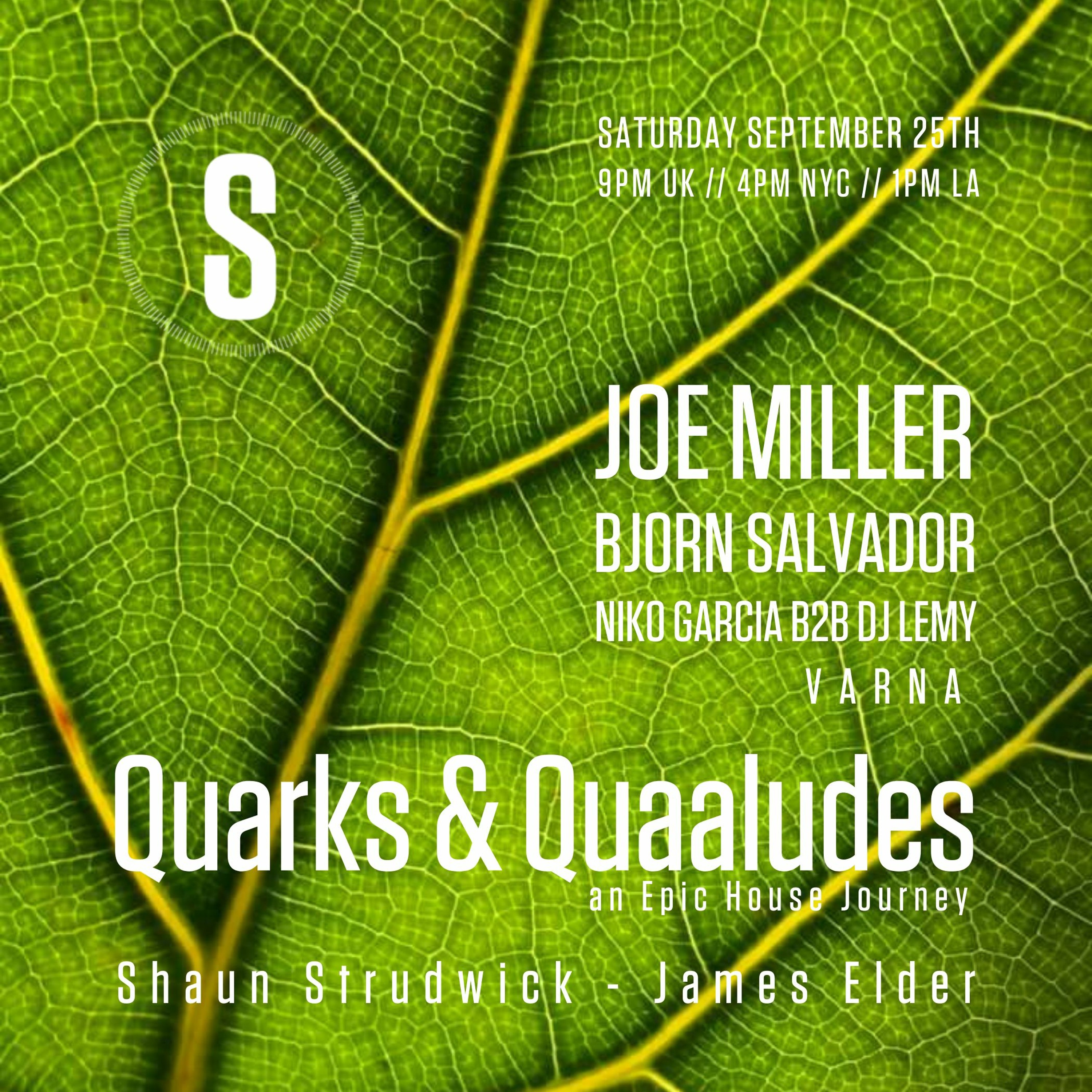
Quarks & Quaaludes #EpicHouseJourneyQ&Q Sept 2021 - Niko Garcia & Dj Lemy@nikogarcia-oficial
@dj-lemy-n1
Tracklist:
01. Maxi Degrassi - Go Ahead (Original Mix) [Submarine Vibes]
02. Plecta - Astrantia ID
03. Eduardo McGregor, Madraas - Searching the Sun (Original Mix)
[All Day I Dream]
04. Husa & Zeyada - Trick of Mind (Erdi Irmak Remix) [IAMHER]
05. Govinda (Arg) - Novena (RIGOONI Remix) [Just Movement]
06. Rodrigo Lapena - Infinite though (Original Mix) The Purr
07. Ben Tucker - Faltered Dreams (Original Mix) Keyfound
08. Navaa & Niko Garcia - Source of Life (Dj lemy Remix) white label
09. Niko Garcia - NO ID
10. Niko Garcia & Bjorn Salvador & Leon S Kemp Feat. Marta Vidal - No ID
2021-09-2659 min
日本語 Japanese with DuolingoJapanese with duolingo going to bank adventure / 銀行まで行きますsentences *this is my practice pronunciation and sentences might be wrong*
おはようございます。
どうやって銀行まで行きますか?
道の向こうに銀行があります。
銀行はそちらです。
はじめに大きな病院のそばを通ります。
次にお店は通ります。
ありがとうさあ行きましょう
銀行はここです
でも、小さなです
銀行に入ります。
そちらの入り口からどうぞ。
はい、すみません
銀行を出口ます
銀行の出口はどちらですか?
出口は向こうです。
あらあら、出口は大きいです
2021-09-1803 min
日本語 Japanese with DuolingoDuolingo Japanese skill Weather 2 japanese practice duolingoSorry for delay, I was sick, I'll try to post more in the coming weeks link
晴れ (ha-re) = sunny/clear (はれ) 晴れます (ha-re-ma-su) = it is/it will be sunny/clear (at the moment) (はれます) 晴れでした (ha-re-de-shi-ta) = it was sunny (はれでした) 良い (yo-i) = fine/good (よい) いい (i-i) = it is/it will be nice/good/fine よくない (yo-ku-na-i) = it isn't/it is not good 悪い (wa-ru-i) = bad (わるい) 悪くない (wa-ru-ku-na-i) = it isn't/it is not bad (わるくない) 悪くはない (wa-ru-ku-wa-na-i) = it isn't/it is not necessarily bad (わるくはない) 天気 (ten-ki) = weather (てんき) よくも悪くもない (yo-ku-mo-wa-ru-ku-mo-nai) = It is neither good nor bad (よくもわるくもない) 曇り (ku-mo-ri) = cloudy (くもり) 曇ります (ku-mo-ri-ma-su) = it is/it will be cloudy (くもります) 曇りでした (ku-mo-ri-de-shi-ta) = it was cloudy (くもりでした) 降り (fu-ri) = it fall/falls/fell (ふり) 雨が降り(a-me-ga-fu-ri) = rain/rains (あめがふり) 雨が降ります (a-me-ga-fu-ri-ma-su) = it will rain/it rains (あめがふります) 雨が降りました (a-me-ga-fu-ri-ma-shi-ta) = it rained (あめがふりました) 空 (so-ra) = sky (そら) じゃあ (jyaa) = see you 朝 (a-sa) = morning (あさ) 朝に (a-sa-ni) = in the morning (あさに) 今朝 (ke-sa) = this morning (けさ) 今晩...
2021-09-1706 min
日本語 Japanese with DuolingoJapanese duolingo clothes 1 part 2https://duolingo.fandom.com/wiki/Japanese_Skill:Clothes_1 Lesson 1 コート (koo-to) = coat シャツ (sha-tsu) = shirt 赤い (aka-i) = red (あかい) 白い (shiro-i) = white (しろい) Lesson 2 着ます (ki-ma-su) = wear/wears (for the whole or upper body) (きます) 着ました (ki-ma-shi-ta) = wore (for the whole or upper body) (きました) 青い (ao-i) = blue (あおい) 黄色い (ki-iro-i) = yellow (きいろい) セーター (see-taa) = sweater/sweaters Lesson 3 履きます (ha-ki-ma-su) = wear/wears (for lower body) (はきます) 履きました (ha-ki-ma-shi-ta) = wore/put on (for lower body) (はきました) オレンジ色 (o-re-n-ji-iro) = orange パンツ (pa-n-tsu) = underwear スカート (su-kaa-to) = skirt 靴 (ku-tsu) = shoes (くつ) ズボン (zu-bo-n) = pants/trousers Lesson 4 服 (fu-ku) = clothes/clothing (ふく) 黒い (kuro-i) = black (くろい) 茶色 (cha-iro) = brown (ちゃいろ) ピンク色 (pi-n-ku-iro) = pink 洗います (ara-i-ma-su) = wash/will wash (あらいます) 洗いました (ara-i-ma-shi-ta) = washed (あらいました) 洗いません (ara-i-ma-sen) = do/does not wash (あらいません) Lesson 5 被り (kabu-ri) = I wear/I will wear (for the head) (かぶり) 帽子 (bou-shi) = hat/hats (ぼうし) 欲しい (ho-shi-i) = I want (ほしい) 欲しくない (ho-shi-ku-nai) = I do not want (ほしくない) 脱ぎます (nu-gi-ma-su) = I will take off/remove (ぬぎます) 脱ぎました (nu-gi-ma-shi-ta) = I took off/removed (ぬぎました) Lesson 6 冬 (fu-yu) = winter (ふゆ) 春 (ha-ru) = spring (はる) 夏 (na-tsu) = summer (なつ...
2021-08-2403 min
日本語 Japanese with DuolingoJapanese Duolingo Clothes 1 Wordshttps://duolingo.fandom.com/wiki/Japanese_Skill:Clothes_1
Lesson 1
コート (koo-to) = coat
シャツ (sha-tsu) = shirt
赤い (aka-i) = red (あかい)
白い (shiro-i) = white (しろい)
Lesson 2
着ます (ki-ma-su) = wear/wears (for the whole or upper body) (きます)
着ました (ki-ma-shi-ta) = wore (for the whole or upper body) (きました)
青い (ao-i) = blue (あおい)
黄色い (ki-iro-i) = yellow (きいろい)
セーター (see-taa) = sweater/sweaters
Lesson 3
履きます (ha-ki-ma-su) = wear/wears (for lower body) (はきます)
履きました (ha-ki-ma-shi-ta) = wore/put on (for lower body) (はきました)
オレンジ色 (o-re-n-ji-iro) = orange
パンツ (pa-n-tsu) = underwear
スカート (su-kaa-to) = skirt
靴 (ku-tsu) = shoes (くつ)
ズボン (zu-bo-n) = pants/trousers
Lesson 4
服 (fu-ku) = clothes/clothing (ふく)
黒い (kuro-i) = black (くろい)
茶色 (cha-iro) = brown (ちゃいろ)
ピンク色 (pi-n-ku-iro) = pink
洗います (ara-i-ma-su) = wash/will wash (あらいます)
洗いました (ara-i-ma-shi-ta) = washed (あらいました)
洗いません (ara-i-ma-sen) = do/does not wash (あらいません)
Lesson 5
被り (kabu-ri) = I wear/I will wear (for the head) (かぶり)
帽子 (bou-shi) = hat/hats (ぼうし)
欲しい (ho-shi-i) = I want (ほしい)
欲しくない (ho-shi-ku-nai) = I do not want (ほしくない)
脱ぎます (nu-gi-ma-su) = I will take off/remove (ぬぎます)
脱ぎました (nu-gi-ma-shi-ta) = I took off/removed (ぬぎました)
Lesson 6
冬 (fu-yu) = winter (ふゆ)
春 (ha-ru) = spring (はる)
夏 (na-tsu) = summer (なつ)
秋 (
2021-08-2208 min
日本語 Japanese with DuolingoJapanese Duolingo Clothes 1 part 1https://duolingo.fandom.com/wiki/Japanese_Skill:Clothes_1
Lesson 1
コート (koo-to) = coat
シャツ (sha-tsu) = shirt
赤い (aka-i) = red (あかい)
白い (shiro-i) = white (しろい)
Lesson 2
着ます (ki-ma-su) = wear/wears (for the whole or upper body) (きます)
着ました (ki-ma-shi-ta) = wore (for the whole or upper body) (きました)
青い (ao-i) = blue (あおい)
黄色い (ki-iro-i) = yellow (きいろい)
セーター (see-taa) = sweater/sweaters
Lesson 3
履きます (ha-ki-ma-su) = wear/wears (for lower body) (はきます)
履きました (ha-ki-ma-shi-ta) = wore/put on (for lower body) (はきました)
オレンジ色 (o-re-n-ji-iro) = orange
パンツ (pa-n-tsu) = underwear
スカート (su-kaa-to) = skirt
靴 (ku-tsu) = shoes (くつ)
ズボン (zu-bo-n) = pants/trousers
Lesson 4
服 (fu-ku) = clothes/clothing (ふく)
黒い (kuro-i) = black (くろい)
茶色 (cha-iro) = brown (ちゃいろ)
ピンク色 (pi-n-ku-iro) = pink
洗います (ara-i-ma-su) = wash/will wash (あらいます)
洗いました (ara-i-ma-shi-ta) = washed (あらいました)
洗いません (ara-i-ma-sen) = do/does not wash (あらいません)
Lesson 5
被り (kabu-ri) = I wear/I will wear (for the head) (かぶり)
帽子 (bou-shi) = hat/hats (ぼうし)
欲しい (ho-shi-i) = I want (ほしい)
欲しくない (ho-shi-ku-nai) = I do not want (ほしくない)
脱ぎます (nu-gi-ma-su) = I will take off/remove (ぬぎます)
脱ぎました (nu-gi-ma-shi-ta) = I took...
2021-08-2203 min
日本語 Japanese with DuolingoDirection 1 part 4Duolingo Japanese skillJapanese Skill:Direct. 1 | Duolingo Wiki | Fandom
Lesson 1
どちら (do-chi-ra) = which way
こちら (ko-chi-ra) = over here/this way
建物 (ta-te-mo-no) = building (たてもの)
入り口 (i-ri-gu-chi) = entrance (いりぐち)
出口 (de-gu-chi) = exit (でぐち)
Lesson 2
どうやって (dou-ya-tte) = how (by what means), by which route/way
銀行 (gin-kou) = bank (ぎんこう)
コンビニ (kon-bi-ni) = convenience store/stores
病院 (byou-in) = hospital (びょういん)
そちら (so-chi-ra) = that/that way, there
そちらの入り口 (so-chi-ra-no-i-ri-gu-chi) = that way's entrance (そちらのいりぐち)
どうぞ (dou-zo) = please/go ahead/by all means
Lesson 3
道 (mi-chi) = road/roads, street/path (みち)
店 (mi-se) = store (みせ)
お店 (o-mi-se) = shop/store (polite) (おみせ)
お部屋 (o-he-ya) = room (polite) (おへや)
出ます (de-ma-su) = I exit/leave/go out (verb) (でます)
向こう (mu-kou) = over there (むこう)
あちら (a-chi-ra) = over there/in that direction
道の向こう (mi-chi-no-mu-kou) = across the street
Lesson 4
北 (ki-ta) = north (きた)
北東 (ho-ku-tou) = northeast (ほくとう)
東 (hi-ga-shi) = east (ひがし)
南 (mi-na-mi) = south (みなみ)
西 (ni-shi) = west (にし)
南アメリカ (mi-na-mi-a-me-ri-ka) = South America (みなみ あめりか)
Lesson 5
通り (too-ri) = street (とおり)
通ります (too-ri-ma-su) = to pass (とおります)
のそば (no-so-ba) = by
はじめに (ha-ji-me-ni) = first/firstly
入ります (hai-ri-ma-su) = I enter (はります)
...
2021-08-0504 min
日本語 Japanese with DuolingoDuolingo Japanese skill direction 1 part 3Do your best please. ガンばてください
Japanese Skill:Direct. 1 | Duolingo Wiki | Fandom
Lesson 1
どちら (do-chi-ra) = which way
こちら (ko-chi-ra) = over here/this way
建物 (ta-te-mo-no) = building (たてもの)
入り口 (i-ri-gu-chi) = entrance (いりぐち)
出口 (de-gu-chi) = exit (でぐち)
Lesson 2
どうやって (dou-ya-tte) = how (by what means), by which route/way
銀行 (gin-kou) = bank (ぎんこう)
コンビニ (kon-bi-ni) = convenience store/stores
病院 (byou-in) = hospital (びょういん)
そちら (so-chi-ra) = that/that way, there
そちらの入り口 (so-chi-ra-no-i-ri-gu-chi) = that way's entrance (そちらのいりぐち)
どうぞ (dou-zo) = please/go ahead/by all means
Lesson 3
道 (mi-chi) = road/roads, street/path (みち)
店 (mi-se) = store (みせ)
お店 (o-mi-se) = shop/store (polite) (おみせ)
お部屋 (o-he-ya) = room (polite) (おへや)
出ます (de-ma-su) = I exit/leave/go out (verb) (でます)
向こう (mu-kou) = over there (むこう)
あちら (a-chi-ra) = over there/in that direction
道の向こう (mi-chi-no-mu-kou) = across the street
Lesson 4
北 (ki-ta) = north (きた)
北東 (ho-ku-tou) = northeast (ほくとう)
東 (hi-ga-shi) = east (ひがし)
南 (mi-na-mi) = south (みなみ)
西 (ni-shi) = west (にし)
南アメリカ (mi-na-mi-a-me-ri-ka) = South America (みなみ あめりか)
Lesson 5
通り (too-ri) = street (とおり)
通ります (too-ri-ma-su) = to pass (とおります)
のそば (no-so-ba) = by
はじめに (ha-ji-me-ni...
2021-08-0505 min
日本語 Japanese with DuolingoDuolingo Japanese skill direction 1 part 2Do your best please. ガンばてください
Japanese Skill:Direct. 1 | Duolingo Wiki | Fandom
Lesson 1
どちら (do-chi-ra) = which way
こちら (ko-chi-ra) = over here/this way
建物 (ta-te-mo-no) = building (たてもの)
入り口 (i-ri-gu-chi) = entrance (いりぐち)
出口 (de-gu-chi) = exit (でぐち)
Lesson 2
どうやって (dou-ya-tte) = how (by what means), by which route/way
銀行 (gin-kou) = bank (ぎんこう)
コンビニ (kon-bi-ni) = convenience store/stores
病院 (byou-in) = hospital (びょういん)
そちら (so-chi-ra) = that/that way, there
そちらの入り口 (so-chi-ra-no-i-ri-gu-chi) = that way's entrance (そちらのいりぐち)
どうぞ (dou-zo) = please/go ahead/by all means
Lesson 3
道 (mi-chi) = road/roads, street/path (みち)
店 (mi-se) = store (みせ)
お店 (o-mi-se) = shop/store (polite) (おみせ)
お部屋 (o-he-ya) = room (polite) (おへや)
出ます (de-ma-su) = I exit/leave/go out (verb) (でます)
向こう (mu-kou) = over there (むこう)
あちら (a-chi-ra) = over there/in that direction
道の向こう (mi-chi-no-mu-kou) = across the street
Lesson 4
北 (ki-ta) = north (きた)
北東 (ho-ku-tou) = northeast (ほくとう)
東 (hi-ga-shi) = east (ひがし)
南 (mi-na-mi) = south (みなみ)
西 (ni-shi) = west (にし)
南アメリカ (mi-na-mi-a-me-ri-ka) = South America (みなみ あめりか)
Lesson 5
通り (too-ri) = street (とおり)
通ります (too-ri-ma-su) = to pass (とおります)
のそば (no-so-ba) = by
はじめに (ha-ji-me-ni...
2021-08-0206 min
日本語 Japanese with DuolingoDuolingo Japanese skill direction 1 lesson 1Do your best please. ガンばてください
Japanese Skill:Direct. 1 | Duolingo Wiki | Fandom
Lesson 1
どちら (do-chi-ra) = which way
こちら (ko-chi-ra) = over here/this way
建物 (ta-te-mo-no) = building (たてもの)
入り口 (i-ri-gu-chi) = entrance (いりぐち)
出口 (de-gu-chi) = exit (でぐち)
Lesson 2
どうやって (dou-ya-tte) = how (by what means), by which route/way
銀行 (gin-kou) = bank (ぎんこう)
コンビニ (kon-bi-ni) = convenience store/stores
病院 (byou-in) = hospital (びょういん)
そちら (so-chi-ra) = that/that way, there
そちらの入り口 (so-chi-ra-no-i-ri-gu-chi) = that way's entrance (そちらのいりぐち)
どうぞ (dou-zo) = please/go ahead/by all means
Lesson 3
道 (mi-chi) = road/roads, street/path (みち)
店 (mi-se) = store (みせ)
お店 (o-mi-se) = shop/store (polite) (おみせ)
お部屋 (o-he-ya) = room (polite) (おへや)
出ます (de-ma-su) = I exit/leave/go out (verb) (でます)
向こう (mu-kou) = over there (むこう)
あちら (a-chi-ra) = over there/in that direction
道の向こう (mi-chi-no-mu-kou) = across the street
Lesson 4
北 (ki-ta) = north (きた)
北東 (ho-ku-tou) = northeast (ほくとう)
東 (hi-ga-shi) = east (ひがし)
南 (mi-na-mi) = south (みなみ)
西 (ni-shi) = west (にし)
南アメリカ (mi-na-mi-a-me-ri-ka) = South America (みなみ あめりか)
Lesson 5
通り (too-ri) = street (とおり)
通ります (too-ri-ma-su) = to pass (とおります)
のそば (no-so-ba) = by
はじめに (ha-ji-me-ni...
2021-06-2303 min
Before It's Too LateJammal Lemy: mobilising voices to be heardIt makes me very happy to have 23 years-old activist, artist and movement creator Jammal Lemy as today’s guest. He has become known to a larger public, when he served as creative director for MARCH FOR OUR LIVES, one of the largest and most impactful youth-led movements in global history against gun violence, after a school shooting in his former High School Marjory Stoneman Douglas in Florida in 2018. 17 people were killed. You will hear how his idea to create T-Shirts with the American flag and a QR-code on it made it happen for over 50.000 people to scan and register for th...
2021-06-1127 min
日本語 Japanese with DuolingoHobby 2 part 2Japanese Skill:Hobby 2 | Duolingo Wiki | Fandom
Lesson 1
公園 (kou-en) = park (こうえん)
プール (puu-ru) = pool
一緒に (i-ssho-ni) = together (いっしょに)
今週 (kon-shuu) = this week (こんしゅう)
ませんか (ma-sen-ka) = would you like to
Lesson 2
映画館 (ei-ga-kan) = cinema/movie theater (えいがかん)
会いました (a-i-ma-shi-ta) = I met (あいました)
ましょう (ma-shou) = let's
ましょうか (ma-shou-ka) = shall we?
泳ぎましょう (oyo-gi-ma-shou) = let's swim (およぎましょう)
またね (ma-ta-ne) = see you later
来週 (rai-shuu) = next week (らいしゅう)
また (ma-ta) = again/also
また来週 (ma-ta-rai-shuu) = see you next week (またらいしゅう)
来月 (rai-getsu) = next month (らいげつ)
Lesson 3
忙しくない (isoga-shi-ku-na-i) = I am not busy (いそがしくない)
今月 (kon-getsu) = this month (こんげつ)
さあ (sa-a) = come on, I'm not sure, well/now
行きましょう (i-ki-ma-shou) = let's go (いきましょう)
電話 (den-wa) = telephone (でんわ)
電話をかけます (den-wa-o-ka-ke-ma-su) = I call/will call on the phone (でんわをかけます)
何も (nani-mo) = nothing (なにも)
Lesson 4
先週 (sen-shuu) = last week (せんしゅう)
先月 (sen-getsu) = last month (せんげつ)
電話をかけました (den-wa-o-ka-ke-ma-shi-ta) = I called on the phone (でんわをかけました)
教えます (o-shi-e-ma-su) = I teach (おしえます)
ピアノ (pi-a-no) = piano
弾きます (hi-ki-ma-su) = I play (an instrument) (ひきます)
弾きません (hi-ki-ma-sen) = do/does not play (an instrument) (ひきません)
泳ぎ...
2021-05-2906 min
日本語 Japanese with DuolingoDuolingo Japanese skill hobby 2 part 1Japanese Skill:Hobby 2 | Duolingo Wiki | Fandom
Lesson 1
公園 (kou-en) = park (こうえん)
プール (puu-ru) = pool
一緒に (i-ssho-ni) = together (いっしょに)
今週 (kon-shuu) = this week (こんしゅう)
ませんか (ma-sen-ka) = would you like to
Lesson 2
映画館 (ei-ga-kan) = cinema/movie theater (えいがかん)
会いました (a-i-ma-shi-ta) = I met (あいました)
ましょう (ma-shou) = let's
ましょうか (ma-shou-ka) = shall we?
泳ぎましょう (oyo-gi-ma-shou) = let's swim (およぎましょう)
またね (ma-ta-ne) = see you later
来週 (rai-shuu) = next week (らいしゅう)
また (ma-ta) = again/also
また来週 (ma-ta-rai-shuu) = see you next week (またらいしゅう)
来月 (rai-getsu) = next month (らいげつ)
Lesson 3
忙しくない (isoga-shi-ku-na-i) = I am not busy (いそがしくない)
今月 (kon-getsu) = this month (こんげつ)
さあ (sa-a) = come on, I'm not sure, well/now
行きましょう (i-ki-ma-shou) = let's go (いきましょう)
電話 (den-wa) = telephone (でんわ)
電話をかけます (den-wa-o-ka-ke-ma-su) = I call/will call on the phone (でんわをかけます)
何も (nani-mo) = nothing (なにも)
Lesson 4
先週 (sen-shuu) = last week (せんしゅう)
先月 (sen-getsu) = last month (せんげつ)
電話をかけました (den-wa-o-ka-ke-ma-shi-ta) = I called on the phone (でんわをかけました)
教えます (o-shi-e-ma-su) = I teach (おしえます)
ピアノ (pi-a-no) = piano
弾きます (hi-ki-ma-su) = I play (an instrument) (ひきます)
弾きません (hi-ki-ma-sen) = do/does not play (an instrument) (ひきません)
泳ぎませんでした (oyo-gi-ma-sen-de-shi-ta) = I did not swim (およぎませんでした)
あまり = not much
Lesson 5
再来週 (sa-rai-shuu) = the week after next (さらいしゅう)
ギター (gi-taa) = guitar
練習 (ren-shuu) = practice (れんしゅう...
2021-05-2806 min
日本語 Japanese with DuolingoFood 2 part 3Lesson 1
今日の (kyou-no) = today's (きょうの)
夕飯 (yuu-han) = dinner (ゆうはん)
お弁当 (o-ben-tou) = lunchbox/boxed lunch/bento (おべんとう)
全然 (zen-zen) = not at all (ぜんぜん)
おいしくないです (o-i-shi-ku-na-i-de-su) = it is not delicious/tasty, it doesn't taste good
おいしくないですか?(o-i-shi-ku-na-i-de-su-ka) = isn't it delicious/doesn't it taste good?
Lesson 2
果物 (kuda-mono) = fruit (くだもの)
塩 (shio) = salt (しお)
いかがですか?(i-ka-ga-de-su-ka) = would you like/how is it?
Lesson 3
醤油 (shou-yu) = soy sauce (しょうゆ)
砂糖 (sa-tou) = sugar (さとう)
多いです (oo-i-de-su) = a lot / many / much (おおい)
結構 (ke-kkou) = quite (けっこう)
結構です (ke-kkou-de-su) = thanks, -literally: 'fine as it is already': to politely refuse something [1] (けっこうです)
Lesson 4
食べ物 (ta-be-mono) = food (たべもの)
飲み物 (no-mi-mono) = drink / something to drink / drinks/ beverages (noun) (のみもの)
にしますか?(ni-shi-ma-su-ka) = would you like?
Lesson 5
お酒 (o-sake) = alcohol (おさけ)
牛乳 (gyuu-nyuu) = milk/some milk (ぎゅうにゅう)
飲みません (no-mi-ma-se-n) = do not/don't drink (のみません)
多くないです (oo-ku-na-i-de-su) = it/there is not much/not a lot, there aren't many (おおくないです)
まったく (ma-tta-ku) = (there is) no 'x' at all/(there is) none at all, none whatsoever...
2021-05-0804 min
日本語 Japanese with DuolingoDuolingo Japanese skillFood 2 part 2Lesson 1
今日の (kyou-no) = today's (きょうの)
夕飯 (yuu-han) = dinner (ゆうはん)
お弁当 (o-ben-tou) = lunchbox/boxed lunch/bento (おべんとう)
全然 (zen-zen) = not at all (ぜんぜん)
おいしくないです (o-i-shi-ku-na-i-de-su) = it is not delicious/tasty, it doesn't taste good
おいしくないですか?(o-i-shi-ku-na-i-de-su-ka) = isn't it delicious/doesn't it taste good?
Lesson 2
果物 (kuda-mono) = fruit (くだもの)
塩 (shio) = salt (しお)
いかがですか?(i-ka-ga-de-su-ka) = would you like/how is it?
Lesson 3
醤油 (shou-yu) = soy sauce (しょうゆ)
砂糖 (sa-tou) = sugar (さとう)
多いです (oo-i-de-su) = a lot / many / much (おおい)
結構 (ke-kkou) = quite (けっこう)
結構です (ke-kkou-de-su) = thanks, -literally: 'fine as it is already': to politely refuse something [1] (けっこうです)
Lesson 4
食べ物 (ta-be-mono) = food (たべもの)
飲み物 (no-mi-mono) = drink / something to drink / drinks/ beverages (noun) (のみもの)
にしますか?(ni-shi-ma-su-ka) = would you like?
Lesson 5
お酒 (o-sake) = alcohol (おさけ)
牛乳 (gyuu-nyuu) = milk/some milk (ぎゅうにゅう)
飲みません (no-mi-ma-se-n) = do not/don't drink (のみません)
多くないです (oo-ku-na-i-de-su) = it/there is not much/not a lot, there aren't many (おおくないです)
まったく (ma-tta-ku) = (there is) no 'x' at all/(there is) none at all, none whatsoever, absolutely none
まったく多くないです (ma-tta-ku-oo-ku-na-i-de-su) = not much at all
Lesson 6
とても (to-te-mo) = very
少ない (suku-na-i) = little/not much (すくない)
...
2021-05-0802 min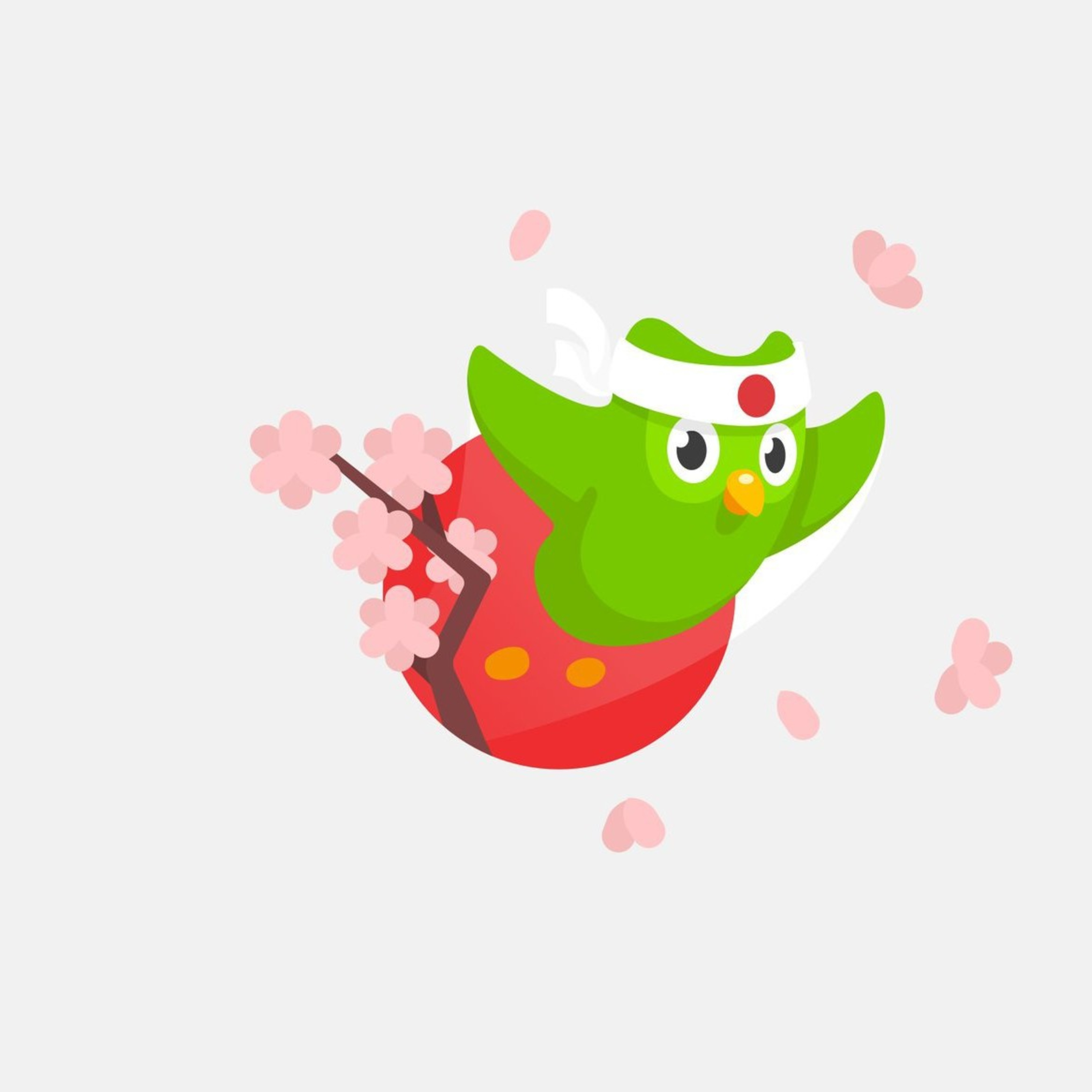
日本語 Japanese with DuolingoDuolingo Japanese skill Food 2 part 1 duolingo 食べ物にLesson 1
今日の (kyou-no) = today's (きょうの)
夕飯 (yuu-han) = dinner (ゆうはん)
お弁当 (o-ben-tou) = lunchbox/boxed lunch/bento (おべんとう)
全然 (zen-zen) = not at all (ぜんぜん)
おいしくないです (o-i-shi-ku-na-i-de-su) = it is not delicious/tasty, it doesn't taste good
おいしくないですか?(o-i-shi-ku-na-i-de-su-ka) = isn't it delicious/doesn't it taste good?
Lesson 2
果物 (kuda-mono) = fruit (くだもの)
塩 (shio) = salt (しお)
いかがですか?(i-ka-ga-de-su-ka) = would you like/how is it?
Lesson 3
醤油 (shou-yu) = soy sauce (しょうゆ)
砂糖 (sa-tou) = sugar (さとう)
多いです (oo-i-de-su) = a lot / many / much (おおい)
結構 (ke-kkou) = quite (けっこう)
結構です (ke-kkou-de-su) = thanks, -literally: 'fine as it is already': to politely refuse something [1] (けっこうです)
Lesson 4
食べ物 (ta-be-mono) = food (たべもの)
飲み物 (no-mi-mono) = drink / something to drink / drinks/ beverages (noun) (のみもの)
にしますか?(ni-shi-ma-su-ka) = would you like?
Lesson 5
お酒 (o-sake) = alcohol (おさけ)
牛乳 (gyuu-nyuu) = milk/some milk (ぎゅうにゅう)
飲みません (no-mi-ma-se-n) = do not/don't drink (のみません)
多くないです (oo-ku-na-i-de-su) = it/there is not much/not a lot, there aren't many (おおくないです)
まったく (ma-tta-ku) = (there is) no 'x' at all/(there is) none at all, none whatsoever, absolutely none
まったく多くないです (ma-tta-ku-oo-ku-na-i-de-su) = not much at all
Lesson 6
とても (to-te-mo) = very
少ない (suku-na-i) = little/not much (すくない)
...
2021-04-2304 min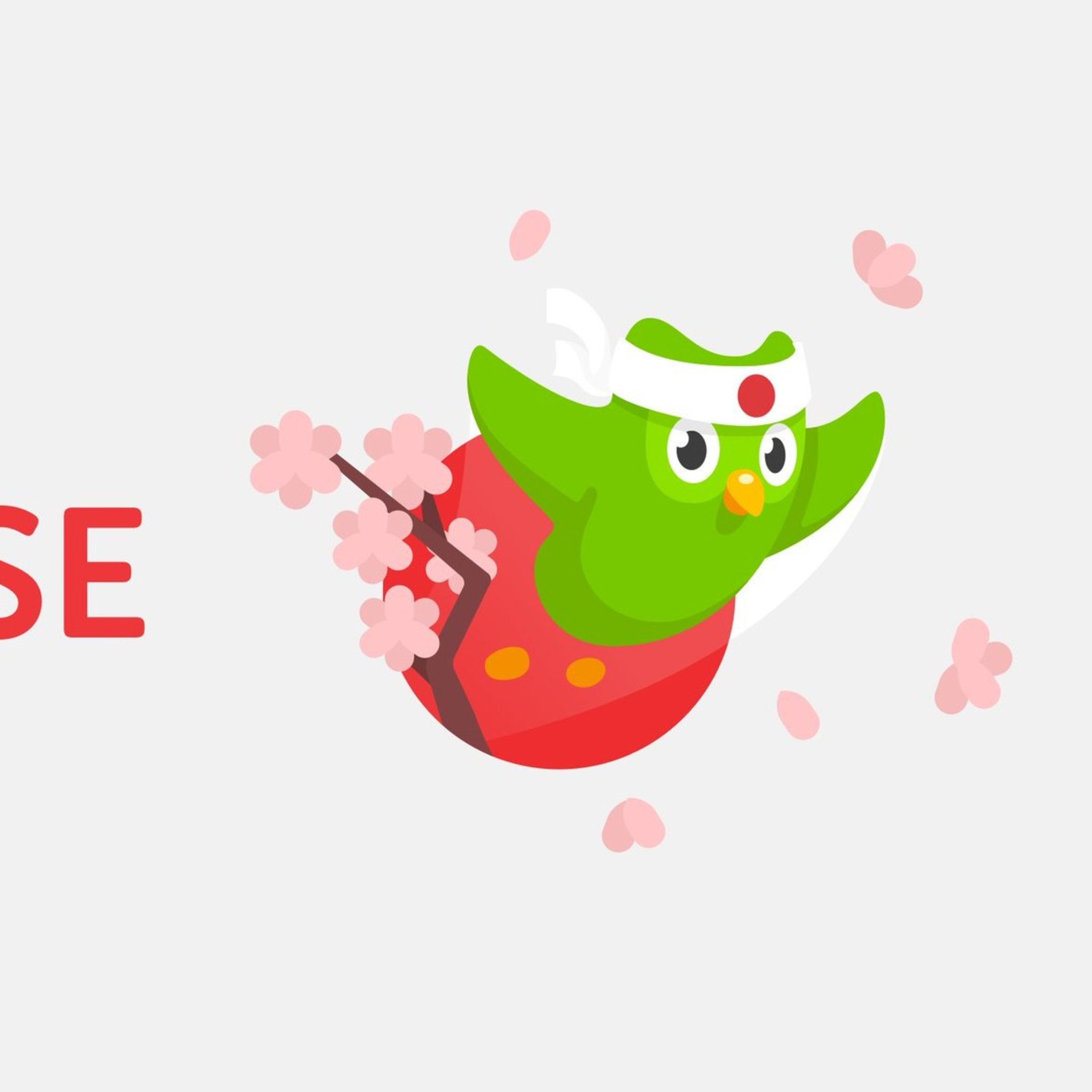 2021-03-2103 min
2021-03-2103 min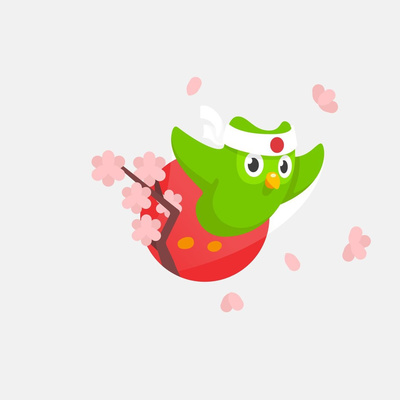
日本語 Japanese with Duolingoweather 1 Japanese with duolingoPlease check our other works:Fan Fiction The First Quidditch School Tournament click hereYoutube Channel click here晴れ (ha-re) = sunny/clear (はれ)晴れます (ha-re-ma-su) = it is/it will be sunny/clear (at the moment) (はれます)晴れでした (ha-re-de-shi-ta) = it was sunny (はれでした)良い (yo-i) = fine/good (よい)いい (i-i) = it is/it will be nice/good/fineよくない (yo-ku-na-i) = it isn't/it is not good悪い (wa-ru-i) = bad (わるい)悪くない (wa-ru-ku-na-i) = it isn't/it is not bad (わるくない)悪くはない (wa-ru-ku-wa-na-i) = it isn't/it is not necessarily bad (わるくはない)天気 (ten-ki) = weather (てんき)よくも悪くもない (yo-ku-mo-wa-ru-ku-mo-nai) = It is neither good nor bad (よくもわるくもない)曇り (ku-mo-ri) = cloudy (くもり)曇ります (ku-mo-ri-ma-su) = it is/it will be cloudy (くもります)曇りでした (ku-mo-ri-de-shi-ta) = it was cloudy (くもりでした)降り (fu-ri) = it fall/falls/fell (ふり)雨が降り(a-me-ga-fu-ri) = rain/rains (あめがふり)雨が降ります (a-me-ga-fu-ri-ma-su) = it will rain/it rains (あめがふります)雨が降りました (a-me-ga-fu-ri-ma-shi-ta) = it rained (あめがふりました)空 (so-ra) = sky (そら)じゃあ (jyaa) = see...
2021-03-2013 min 2021-03-1900 min
2021-03-1900 min
Narinig ko sa PolyrepLEMY: Tell You A StoryPakinggan ang kwento ni Lemy tungkol sa mga dilemma na kanyang kinaharap sa likod ng nakangiting maskara at kung paano niya nahanap ang pagpapahalaga sa sarili at sa kapwa na nagpatatag sa kanya para maging buo at positibo sa lahat ng pagkakataon.
2020-08-2918 min
The CommonAlly ChroniclesArt & Activism: The Jammal Lemy InterviewFrom helping mobilize March For Our Lives, a worldwide youth-led movement against gun violence to blazing a new path as founder of MODEMA Studios--a multilingual creative studio, Jammal Lemy knows a thing or two about putting something special into action. We chat with Jammal about how activism is being redefined, how the pandemic sees race and what it means to find commonalities in one another.
CommonAlly: https://www.commonally.com/
Jammal Lemy: https://www.jammallemy.com/
---
This episode is sponsored by
· Anchor: The easiest way to make a podcast. https://a...
2020-05-0247 min
Dj Crown PrinceKERWIN DU BOIS - SPOIL MEHSELF (LEMY CURREY x DJ CROWN PRINCE REMIX) WALSHY FIRE PRESENTSLemy Currey and Myself started this remix on my good friend Kerwin Du Bois’ 2014 Carnival hit “Spoil Mehself” last summer and decided that now was the time to finish and release this gem that we kept to ourselves for the last 10 months. My brother Walshy Fire heard it and loved the project. He gave his input and when we decided that it's definitely dope enough to drop, he said it's time to GO!
2015-06-1804 min
Cacoteo RecordsPrende Filly (Cacoteo)- DJ Tito ft. Lemy y Mangani, produced by DJ TitoPrende Filly (Cacoteo)- DJ Tito ft. Lemy y Mangani, produced by DJ Tito by Cacoteo Records
2013-09-1204 min